Enjoy the simple life at these 10 top agritourism farm stays
Mar 16, 2022 • 7 min read
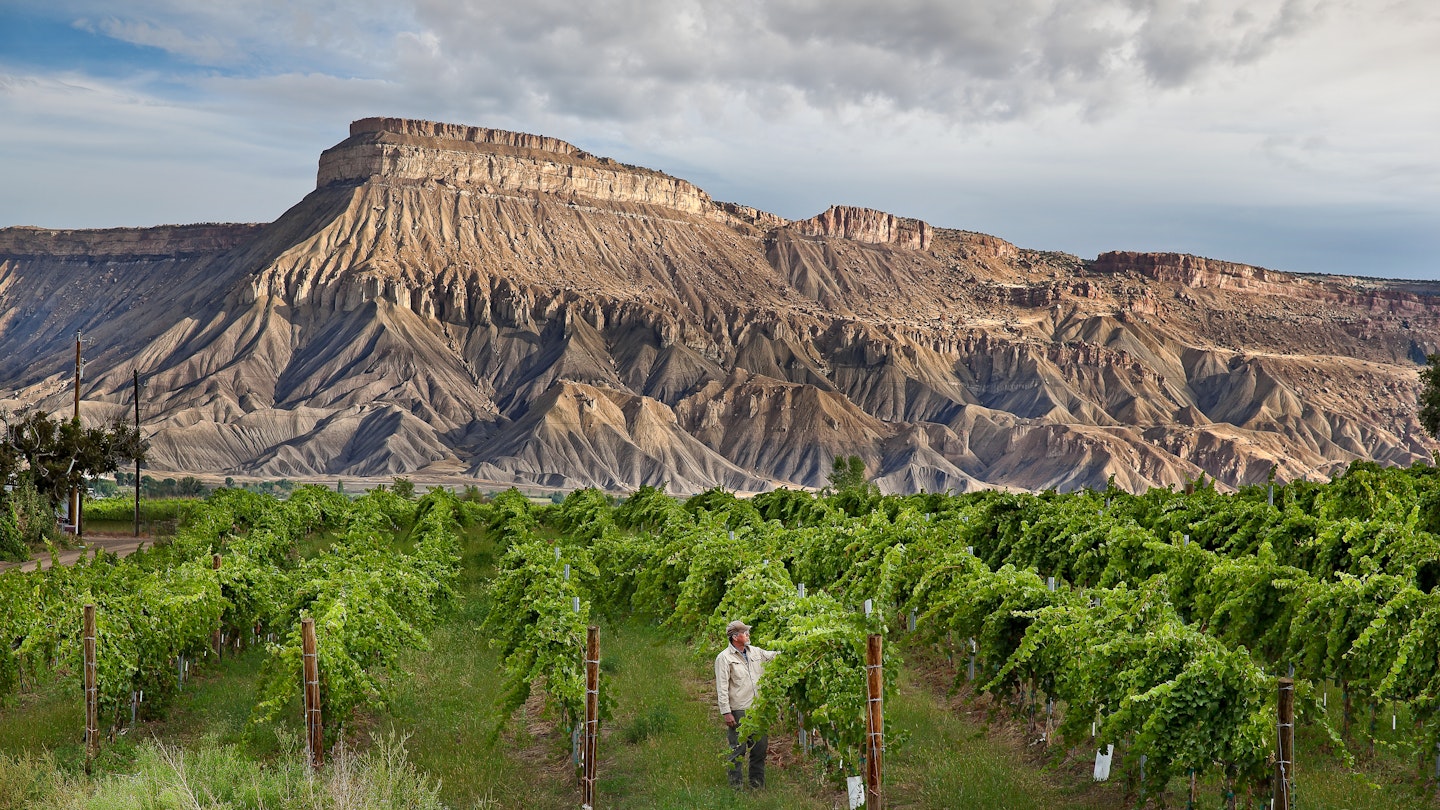
Play an integral part of the process at an agritourism destination © Ken Redding / Getty Images
Agritourism has become a buzzword of sorts — in this day and age, travelers are increasingly more interested in where their food is grown and connecting with the land that provides it. Perhaps this reflects a need to unplug and enjoy a simpler way of life, but farm stays are globally on the rise.

What is agritourism?
Whether it is experiencing life on a working farm or ranch, mingling with animals or assisting with a wine harvest, agritourism is the chance to escape your daily routine and immerse yourself in the world of a local farming experience.
From an organic vineyard in Chile to a ranch in Nebraska and a farm in South Africa , we have compiled a few of the most incredible farm stays around the world.

VIK Hotel & Winery in Chile
A stunning boutique hotel with 22 uniquely-themed rooms, VIK Hotel & Winery is located in Chile ’s Millahue Valley only two hours south of Santiago . Not only do you have access to the surrounding wine country, but there is also an on-site vineyard and winery, Vina VIK. And you don’t need to limit yourself to just imbibing the wine when you can also assist in winemaking from beginning to end – from harvesting the grapes to participating in the fermentation process. Meals are prepared with local ingredients whenever possible and reflect the luxurious experience of this eco-conscious property.
7 stunning hotels where you’ll sleep behind glass walls
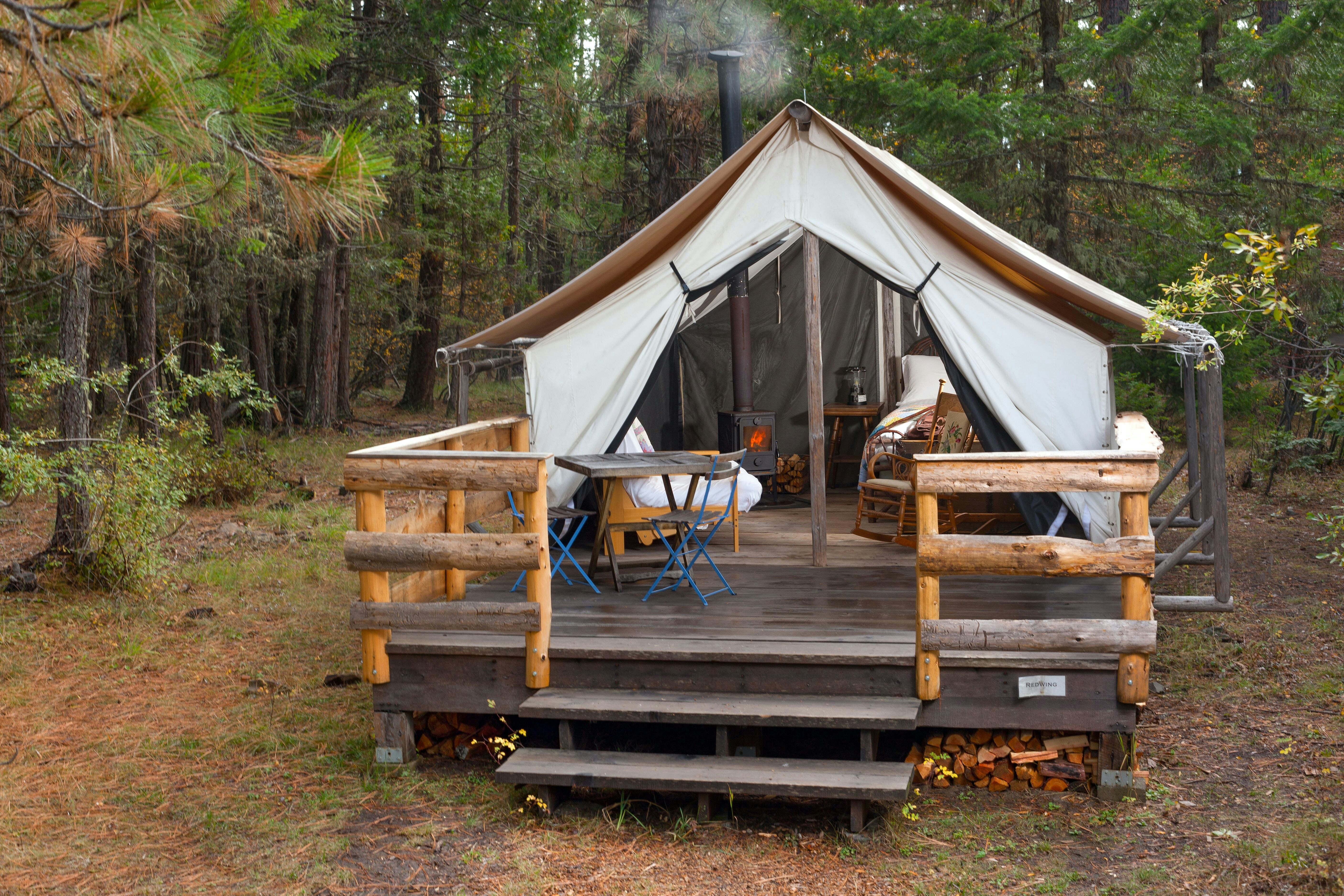
Willow-Witt Ranch in Ashland, Oregon
If you’ve ever entertained a fantasy of living off the grid, the Willow-Witt Ranch outside of Ashland is a good place for a test run. Located in the foothills of Southern Oregon’s Cascade Mountains , this rustic ranch and sustainable farm offers guests the opportunity to participate in all aspects of farm life, including gathering eggs from the chickens and tending to the garden.
For a more in-depth understanding of the area’s history, guided tours of the farm are available. Meander through the hiking trails that surround the ranch, and stop to bottle-feed the baby goats. This is glamping at its finest – and a great spot for families or a romantic adventure for couples.
Don't miss the best of Ashland, Oregon, from literary festivals to outdoor recreation
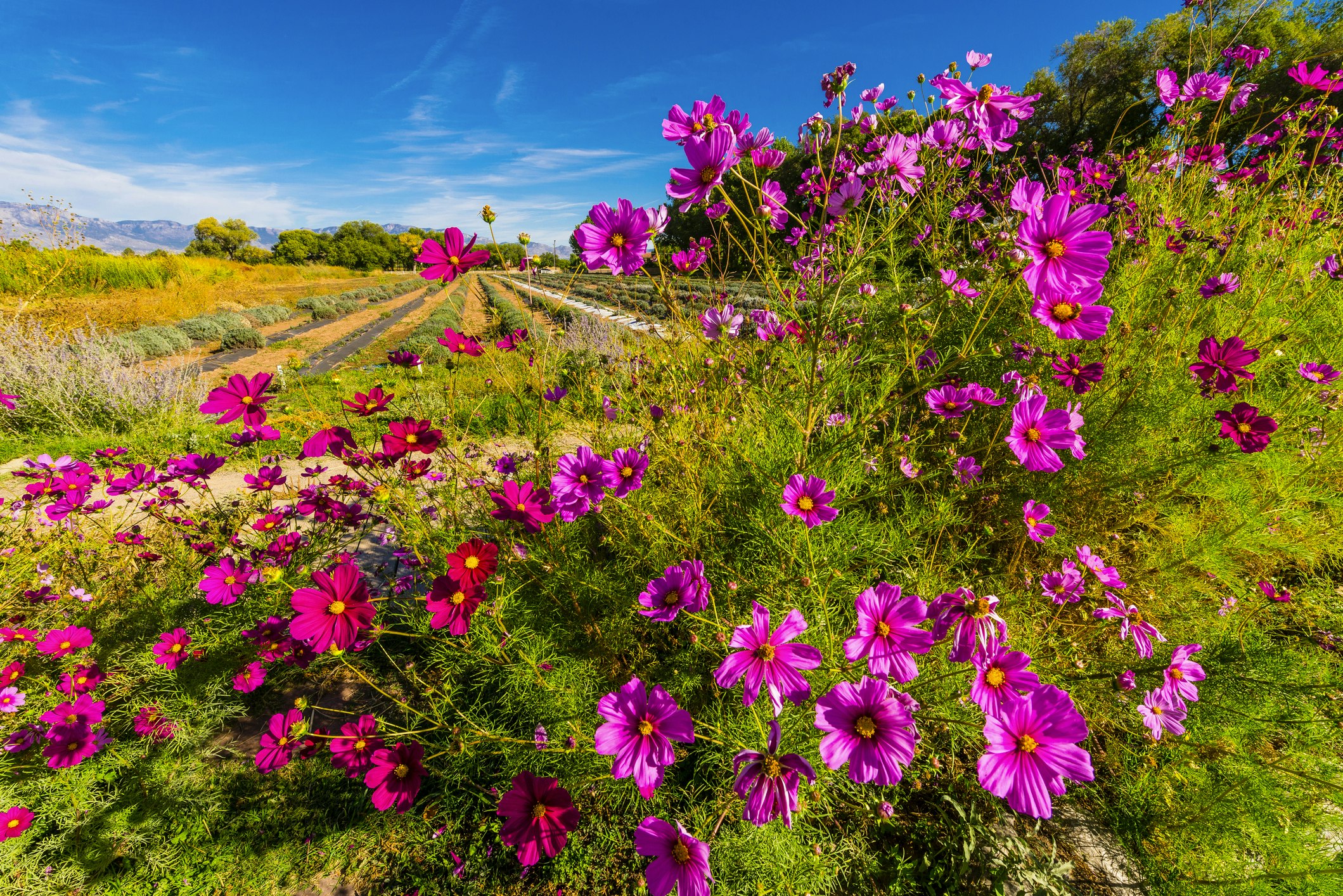
Los Poblanos Historic Inn & Organic Farm in Albuquerque, New Mexico
Imagine walking through fields of lavender, pausing to inhale the fresh scent and admire the giant cottonwood trees that surround them. This is the setting at Los Poblanos , an inn and organic farm in Albuquerque . This inn is steeped in history, and you can immerse yourself in its environment by volunteering to tend the lavender fields or with workshops on aromatherapy and herb cultivation. Although it is an incredibly busy time of the year, try to snag a reservation during the Albuquerque International Balloon Fiesta in early October.
The best museums in Albuquerque explore the city's past and future

Plantation Jan Thiel Lodge in Curaçao
At this guest house on the Caribbean island of Curaçao , guests are invited to roam the lush grounds of Landhuis Jan Thiel and to indulge in homemade breakfasts of omelet that are seasoned with herbs grown in the garden. Take a dip in one of the property’s two pools, and don’t be surprised if Olivia, the owner’s pet sheep, strolls by with one of its canine siblings in tow. This is island living at its best, so relax in the hammock and enjoy the ocean breeze. Or, take a morning stroll to the Salt Lakes , a nearby nature reserve and breeding ground for flamingos.
7 reasons why Curaçao should be your next Caribbean vacation
Laucala Island in Fiji
Fiji’s Laucala Island offers high-end luxury in arguably one of the most beautiful places in the world. With its crystal-clear blue waters that are surrounded by over 3000 acres of mountainous land, a wilderness of rainforest and coconut plantations, this is paradise personified. A private island refuge in the South Pacific , it is owned by Red Bull founder Dietrich Mateschitz. The island is almost fully self-sustainable and the on-site farm provides organic fruits and vegetables as well as free-range poultry and Wagyu cows. Stay in one of the island’s 25 villas and celebrate their “farm to fork” philosophy that is integrated in each of their meals.
Don’t leave Fiji without visiting these national parks and marine sanctuaries

Barnsley Resort in Adairsville, Georgia, USA
From the moment you drive through the ornate gates of the Barnsley Resort in northwest Georgia , you will feel like you have stepped back in time. Located on 3000 acres in a woodland setting surrounded by elaborate gardens, this resort offers all of the luxuries of a Southern estate with the amenities that accompany them, such as a Fazio-designed golf course, shooting grounds and a spa. Enjoy their outdoor “garden-to-table” forest dinners featuring ingredients like farm-grazed beef and locally-foraged mushrooms. While exploring the grounds, you can spend time with a whole range of animals including horses, pigs, sheep, chickens and donkeys.
10 beautiful Georgia hikes to keep you busy from winter to summer

Fattoria Barbialla Nuova in Tuscany, Italy
As you make your way up the winding roads to Fattoria Barbialla Nuova in Tuscany , you will discover a world of charm and tranquility that exists among apricot orchards and a large bio-sensitive farm that is known for Chianina cattle and white truffles. Their attention to sustainability and eco-conscious practices is evident with thermal solar panels, composting and use of rainwater for both the livestock and watering of the garden. Hunt for truffles, learn the fundamentals of Italian cooking, fish, bike, and hike through the oak and poplar forests. Or, venture through the woods – the area is a refuge for deer, wild boars, hedgehogs and badgers.
This secret Italian village has the most charming olive oil harvest
The Farmer's Inn in Viroqua, Wisconsin
Life tends to move at a slower pace in Wisconsin , and the day-to-day at The Farmer’s Inn reflects that. This small dairy farm in the Ocooch area is as bucolic as they come, and when you stay at the two-story, fully-equipped pine log cabin, you will be treated to picturesque views from every angle. Visit the property’s horses, gather eggs from the chicken coop or venture over to one of the area’s many trout streams where you can fly-fish to your heart’s content. Fancy a hayride? Or roasting marshmallows around the open fire pit? You can do all of this and more at The Farmer’s Inn.
Experience the Great Lakes on one epic road trip

Babylonstoren in South Africa
Often referred to as a Garden of Eden in the Cape Winelands of South Africa , Babylonstoren has roots that date as far back as 1692. It is also home to a historic hotel and a majestic garden that was modeled after the renowned Company’s Garden in Cape Town . Tours of this garden are available, or you can get your hands dirty by volunteering to plant, harvest, prune and mulch the land. After a hard day’s work, reward yourself with a glass of wine at the on-site tasting room, or dine at one of the property’s three restaurants. We recommend Greenhouse , which serves its food picnic-style in wooden crates.
The 11 most incredible national parks in South Africa for wildlife, hiking and more

Our Heritage Guest Ranch in Crawford, Nebraska
In the pine-covered hills of northwest Nebraska is Our Heritage Guest Ranch , which was first farmsteaded in 1887. The owners invite guests to immerse themselves in ranch life by assisting with ranch tasks such as fixing fences, feeding livestock and helping to move cattle to different parts of the land. Indulge your inner cowgirl or cowboy by riding the surrounding trails on horseback, and take in the spectacular sunsets which make a daily appearance here. A National Natural Landmark, it is surrounded by the Oglala National Grasslands and next to Toadstool Park— two areas that are ripe for exploration.
You might also like: The best US dude ranches to live like a cowboy 10 charming farm stay vacations in the US Top vegan hotels from around the world
Safety recommendations and restrictions during a pandemic can change rapidly. Lonely Planet recommends that travelers always check with local authorities for up-to-date guidance before traveling during Covid-19 .
This article was first published December 2019 and updated March 2022
Explore related stories

Budget Travel
Apr 21, 2024 • 7 min read
These budget travel tips can help your euros go further in Florence.
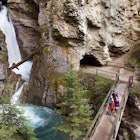
Apr 19, 2024 • 10 min read

Mar 27, 2024 • 5 min read

Mar 20, 2024 • 9 min read

Mar 19, 2024 • 6 min read

Mar 15, 2024 • 10 min read

Mar 13, 2024 • 7 min read

Mar 11, 2024 • 8 min read

Feb 29, 2024 • 12 min read

Feb 28, 2024 • 8 min read

1800 532 9040
- Village Experience
- Agent Registration
Greetings from Rural to urban!
A maharashtra tourism certified agro tourism centre.
Are you ready to go back to your roots?

Directorate of tourism - Maharashtra Tourism
Monteria Village at a glance
Stay options at the village, kutchi bhunga, wooden chalet, village hut, featured experiences at the village, traditional games, costume photo studio.
Re-discover the inner child in you and experience the traditional village games like top, marbles, tyre roll etc.
Get a photograph clicked in traditional Avatar at the photo studio. Style yourself into a unique traditional costume.
Khaat Weaving
We all enjoy resting on khat, let's try to weave one. Get on at weaving a khatiya or a table.
Live the joy of creating a piece of art out of the mud on the pottery wheel, shape the happiness and take home some creative goodness.
Bamboo Basket weaving
Ever wonder how a cane of bamboo is converted into beautiful baskets, Jewelry, musical instruments, get all your answers here and give it a try by yourself too.
Farming & Dhanvantri
Take our farm tour to know how food is grown on the farmland and get to know more about the traditional medicinal plant at our Dhanvantri garden
Village Mela
Witness the village color at the village carnival fest and shake up your mela memories from childhood days.
Visit the traditional kutchi house and click pictures, know the history behind the structure and understand the science of the cooling effect the interior of the house offers.
Swim or Boating in the lake
Plunge into the freshwater lake and enjoy the first-ever natural swimming pool known to us amidst the village or take a paddle boating experience at the Bor talab.
Kathiyawadi Chakkdo
Hop on to the colorful kathiyawadi fun ride and look around the village.
Bamboo Oxy-park
Experience the burst of fresh air in bamboo oxy park by spending 10 to 15 minutes here and getting more than 30% oxygen.
Giant Swing
Can you pull off your balance? if so, wait no more, let your adrenaline rush kick in and swing high on a giant swing and relive the adventure of childhood.
Experiences and Attractions
Waterfall & cave tunnel.
Have a calming walk through the cave to feel the cool vibe of the cave and hear the soothing sound of the waterfall.
Monteria railway station
Take the ticket to Gariyadhar Express and walk through the green express while enjoying the view of the farm.
Wooden carving art
Try your hands on our turner machine which transforms a piece of wood into beautiful wooden artwork.
Mahila Gruh Udyog
We all love to munch on papads and still are trying to say Katcha pappad Pakaa pappad, until then let's try rolling a few papads, pickle, shrikhand and know more about how are they made from the base.
Explore the village school that your grandparents attended, the openness, the simplicity of the village education at Anganwadi.
Hammer the Iron and get to know all the more about how traditionally blacksmith used to shape the raw iron into essential and useful tools.
Barber shop
If it has been too long you have taken a champi, get your head champi in traditional style in addition to shoulder and foot massage at kesh kartanalaya.
Ride a cycle around the village and explore the humbleness of village life around Monteria village to get in touch with the inner warmth.
Swimming pool
Take a plunge and refresh after a days exploration
Dance to the popular numbers whilst enjoying the rain
Day Visit (picnic) Packages
Day picnic from 9AM to 6PM
Adult - Entry + meals
Above 12 years of age
Inclusions : Breakfast, Lunch, Evening tea-coffee and The Monteria Village Experience
Child - Entry + Meals
Below 12 years of age
Inclusions: Breakfast, Lunch, Evening tea-coffee and The Monteria Village Experience
Book you day outing here
Booking / cancellation policy.
- Cancellation of the entry tickets 48 hours prior to date of visit will attract 50% of the total Booking amount
- The refund is valid on 100% amount and not on part payments.
- No refund will be processed, if cancellations are made within 48 hours prior the date of visit
- The booking can be rescheduled up to 60 days from the date of the booking.
Interact with us on
Guest reviews.
Copyright © 2023 Monteria Village - All Rights Reserved.
- Privacy Policy
- Terms and Conditions
Powered by GoDaddy
This website uses cookies.
We use cookies to analyze website traffic and optimize your website experience. By accepting our use of cookies, your data will be aggregated with all other user data.

8 Agro-Tourism Villages to Stay in
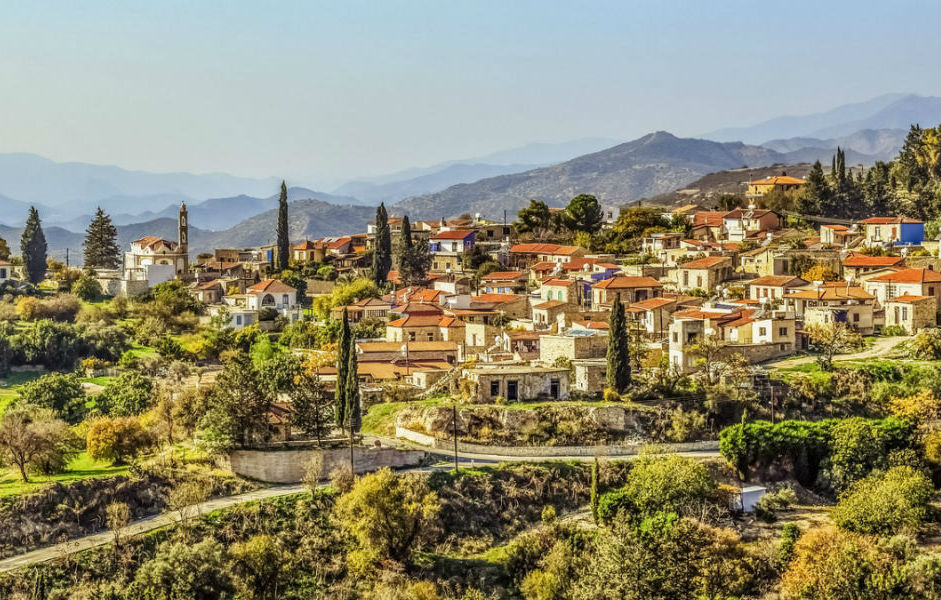
Seeking to escape the city? Look no further than Cyprus’ picturesque mountain villages that are perfect for an urban detox. With traditional stone-built architecture and cobbled streets, these villages offer a great getaway to enjoy a slower pace of life in idyllic landscapes. These beautiful villages have welcoming locals, taverns offering home-cooked dishes and shops selling hand-made Cypriot crafts, all revealing a glimpse into local village lifestyle.
If you’d like to explore unique, isolated villages with a dash of local flavour, here are some of our suggestions for a great travel experience.
Nicosia region
Kalopanayiotis
Within the Marathassa Valley of the Troodos mountain range is Kalopanayiotis village, one of the fourteen villages of the region.
Characteristic of Cypriot mountain villages, the houses in Kalopanayiotis are built along the mountain slopes, so be sure to roam the streets to discover all of its ins and outs. Known for its sulphur springs, many believe that the river water has healing properties as the kings of the area visited the region as a wellness resort centuries ago. Find these mystic waters at the banks of river Setrachos next to the Venetian bridge.
Ideal for outdoor activities, Kalopanayiotis offers nature trails, green picnic areas, a Byzantine museum and six chapels dispersed around the village. If a day trip isn’t enough, rent one of the restored traditional houses, part of the agro-tourism movement, that has recently enriched the Cyprus travel scene.
Fun fact: The village got its name from its first resident and means ‘good Panayiotis’, referring to his name.

An hour’s drive from Nicosia, nestled in the evergreen Solea valley, Galata is a popular destination in both summer and winter, known for its cooler climate during summer heatwaves and for its cosy traditional houses.
Architecture lovers can admire the charm of the old buildings, all decorated with wooden balconies; a distinctive trait of the village. These balconies were the social hubs of the village, as locals would sit on their balconies during summer evenings and watch by-passers. Stay in one of the newly-renovated houses for an authentic ambiance of Galata life.
On your stroll around the village, visit the only mill still operating in Cyprus, Kyrillou, whose entrance is an experience on its own as you have to pass through a tight and low opening of a large rock. Leaving the mill, you can visit one of seven chapels and make a final stop at the Folkore Art Museum to see the working tools of ancient locals, a collection of traditional clothing, kitchen items and furniture.
Limassol region
One of the most well-known villages of the island is Omodos, known for its impressive monastery and its local production of wine, both of which form a vital part of Cyprus’ cultural heritage.
The town centre has pebble-paved streets and are lined with shops and restaurants that lead up to the monastery.
Renowned for its vineyards, Omodos is the perfect place to taste Cypriot wine and zivania , along with some local delicacies also handmade in the village. These delicacies include soutzoukos , palouze and koulourka .
Similarly, you’ll find ideal souvenir gifts that range from handmade embroideries to wonderful brocades and tablecloths.
Located 42km north-west of Limassol and within the Troodos mountain range, Omodos is a great base for visiting nearby villages along the wine route.

Lania is another grape cultivating village that is home to many local and foreign artists. This serene and quaint village radiates an artistic atmosphere with colourful potted plants and wall ceramics decorating its many alleys.
Many artists will happily welcome visitors in their studio or gallery to view or purchase their art. With only a few working taverns, travellers are promised a more personal approach and an intimate culinary experience.
It is best to explore the small village on foot and it’s definitely worth a visit – especially for photography and traditional culture fans. Its picturesque alleys and museums boasting local craftwork, won’t disappoint.
Fun fact: According to tradition,the village got its name from Lana, daughter of Dionysos, God of Wine.
Larnaca region
Only a 20-minute drive from Nicosia, you’ll find the charming village of Lefkara, known throughout the world for its intricate lace and embroidery. The lace and embroidery tradition has been passed down from generation to generation and reached international recognition when the tradition entered the UNESCO list of Intangible Cultural Heritage in 2009.
The lace, also known as lefkaritika , can be found in many shops along the village streets and is a determining factor in Cyprus’s folk art culture. Feel free to lose yourself in the narrow, pebbled-paved streets to find the Lefkara Handicraft Centre and get a real taste of local desserts by taking a Loukoumi workshop.
Try the distinctive meal of Lefkara; tavas , a meat dish mixed with rice and vegetables originating from the village.

Half way between Larnaca and Limassol is the quaint village of Tochni, considered to be one of the oldest villages in Cyprus.
Meander through the narrow alleys and admire the charming housing, the ruins of a Latin church in the centre of the village and visit the St Constantine and Helena church right next to village square.
Today, it is a proud agro-touristic village preserving old Cypriot stone houses by using Tochni stone which is quarried nearby. This type of stone is a trademark of the village and a characteristic of many Cypriot villages.
The few remaining residents will entertain you with stories of the village mosque and give you the best advice for which dishes to try.
Paphos region

One of the most visited villages of Paphos is scenic Kathikas with its century-old buildings preserving the local folklore element.
Situated between Paphos and Latsi, Kathikas is a great choice to use as a base to explore more of the Paphos region. From there, you can easily travel to the Akamas Peninsula and Aphrodite’s Baths.
Surrounded by vineyards, Kathikas is known for its high quality local wines and succulent foods. Enjoy a wine and food pairing at one of Kathikas’s taverns.
Tip: If you’re interested in experiencing local culture, visit during Easter week as the village gathers large crowds that watch re-enactments of Greek Orthodox Easter traditions.
With a population of about sixty residents, Miliou is one of the smallest villages in Cyprus. It is also one of the greenest villages in the area, thanks to an rich supply of spring water which irrigates the surrounding almond trees, vineyards and citrus groves. Spring is a best season to visit as blossoming almond trees decorate the area.
Miliou is a haven for nature lovers due to its expansive valley views and unspoilt countryside, so take long walks and go bird-watching as the village is a nesting site for nightingales. The aroma of fresh air, spring flowers and lemon trees is sure to relax its visitors. A unique place for those seeking a peace of mind.
Related Posts

5 Flowers that Solely Grow in Cyprus
Due to its geographical location at the crossroads of east…

10 churches to celebrate Easter in Nicosia
If you are looking to enjoy a unique Easter experience…
YOU MIGHT LIKE THIS

Rastoni Snack Bar

Intimissimi
Things to do in cyprus.
- Walking-running-hiking in Cyprus
- Cycling in Cyprus
- Golf in Cyprus
- Camping in Cyprus
- Things To Do in Paphos
- Things To Do in Larnaca
- Things To Do in Limassol
- Things To Do in Nicosia
- Things To Do in Famagusta
- Things To Do in Troodos
Activities in Cyprus
- Activities in Paphos
- Activities in Larnaca
- Activities in Limassol
- Activities in Nicosia
- Activities in Famagusta
- Activities in Troodos
Cyprus Events
- Paphos Events
- Larnaca Events
- Limassol Events
- Nicosia Events
- Famagusta Events
Cyprus Museums
Cyprus attractions, cyprus sightseeing, bars in cyprus.
- Bars Paphos
- Bars Larnaca
- Bars Limassol
- Bars Nicosia
- Bars Famagusta
Nightlife in Cyprus
- Nightlife in Paphos
- Nightlife in Larnaca
- Nightlife in Limassol
- Nightlife in Nicosia
- Nightlife in Ayia Napa
- Nightlife in Troodos
Restaurants in Cyprus
- Restaurants in Paphos
- Restaurants in Larnaca
- Restaurants in Limassol
- Restaurants in Nicosia
- Restaurants in Ayia Napa
- Restaurants in Troodos
Hotels in Cyprus
- Hotels in Paphos
- Hotels in Larnaca
- Hotels in Limassol
- Hotels in Nicosia
- Hotels in Ayia Napa
- Hotels in Troodos
Agrotourism in Cyprus
Shopping in cyprus.
- Shopping in Paphos
- Shopping in Larnaca
- Shopping in Limassol
- Shopping in Nicosia
- Shopping in Ayia Napa
- Shopping in Troodos
Cyprus Weddings
Moving to cyprus.
Top 8 Agritourism Destinations in the World
- Metropolitan State University
Slawomir Olzacki / EyeEm / Getty Images
- Sustainable Fashion
- Art & Media
Agritourism is a subsector of the ecotourism industry in which tourists visit farms, ranches, or other agricultural businesses, whether for the purpose of education or entertainment. These vacations can be either an experience—say, for fishing, horseback riding, or touring a tea plantation—or a full-on immersive stay in which guests participate in regular upkeep of crops and livestock for several days.
There's nothing new about this form of travel—people have been working on farms in exchange for accommodation for decades, heading to Italian vineyards or Rocky Mountain dude ranches for what's become known as "WWOOFing" (worldwide opportunities on organic farms). Beyond the beautiful scenery and camaraderie, agritourism helps foster a deeper understanding of global farming processes through hands-on experience.
Here are eight destinations for agritourism around the world.
712 / Getty Images
A couple of things make Taiwan an ideal spot for an in-depth agritourism vacation: Many smaller farms offer homestay accommodation, so guests can mingle with the locals as opposed to staying in hotel rooms, and because the food served and sold is grown locally, this option makes it easier to support sustainable agriculture and lower your carbon footprint while traveling.
Lush, rugged Taiwan is an ideal environment for growing sugar, pineapples and citrus fruits, crude tea, and asparagus—the country's principal cash and export crops. Around 200 “ leisure farms ” spread across 31 designated rural areas offer tours of the fields and facilities for these crops. They also, of course, provide ample chances to sample the products.
itchySan / Getty Images
Tuscany was one of the first destinations to really coin the concept of farm stays, thanks to its atmospheric agriturismos , old farmhouses that were turned into inns when agriculture in Italy was suffering during the 1950s, '60s, and '70s. Now, there are an estimated 20,000 of them around the country, offering an authentic and quaint Italian pastoral experience to people who would otherwise only be able to see this region on a group tour.
While a few of the estates in Tuscany offer a more educational focus, the attraction of staying in a farmhouse in this region can mostly be attributed to the views, the laidback ambiance, and the locally grown olives, grapes, and other fruits. From wine-soaked stays in the Chianti area to farmhouses that create magic out of homegrown tomatoes, herbs, and cheeses, this sun-drenched region is widely celebrated for its agriculture, provisions, and unmatched scenery.
Westend61 / Getty Images
On the popular Spanish island of Mallorca, farmhouse inns focus more on providing isolation and solitude than offering hands-on farming experience. With millions of visitors descending on the beaches of Mallorca and other Balearic Islands each summer, peace and quiet is rare and coveted.
Mainly located in the hills of inland Mallorca, away from coastal crowds, these inns range from rustic century-old farmhouses to luxury bed-and-breakfasts with spas and swimming pools. Some sit in the middle of orange or fig groves and serve dishes made from ingredients grown on-site.
JC Patricio / Getty Images
Brazil is a vast country, 86% of the size of the U.S., with abounding natural resources and a vibrant, diverse agricultural industry. The South American nation is one of the world's largest producers of soy, maize, sugarcane, and rice, and an average supplier of fruit, coffee, eucalyptus, and tropical flowers. While agriculture isn't the bulk of the country's economy , Brazil's innovative and sustainable practices really attract farm-minded travelers.
Brazil provides a global example of regenerating and restoring degraded pastures. According to the Brazilian Confederation of Agriculture and Livestock, a third of rural private properties is dedicated just to preserving native vegetation. Each farm sets aside a minimum of 20% of land for this purpose.
Tourists can experience the rich pastoral culture by embarking on farm tours or opting for an immersive, participatory stay.
Archershoots / Getty Images
The Hawaii Agritourism Association offers resources for tourists who want to have a tropical farm experience, or who simply want to learn about and taste the state's best farm fare. Agritourism options range from visiting coffee plantations in the Big Island's Kona region to exploring the tropical plantations on Maui to staying at organic farms on Oahu.
The vast range of farm tour options caters to both beachgoers and adventure tourists, and can be included briefly in the itinerary so guests don't have to center their whole trip around the state's agriculture (although that would be possible, too).
Frankonline / Getty Images
Tourism is now the largest foreign exchange earner for Grenada, but agriculture is not far behind. This Caribbean country is packed with cocoa plantations, spice farms, and fruit farms. Nutmeg, mace, cloves, cinnamon, and turmeric are grown in higher quantities here than almost anywhere else in the world.
One of the Caribbean's best agritourism resorts, the Belmont Estates , is located in Grenada. This three-century-old estate has a thriving nutmeg and cocoa business, an organic farm, and a restaurant that serves traditional Grenadian food made with ingredients grown on-site. Any tourist keen to see exotic edibles at their source should consider Grenada a top choice for a Caribbean-based farm experience.
Charles O'Rear / Getty Images
More than a third of the vegetables and two-thirds of the fruits and nuts grown in the U.S. come from California. The Golden State is home to a world-famous Wine Country , century-old orchards, avocado farms, fisheries, and more. Naturally, it's an agritourism utopia, and many of the smaller family farms in this West Coast state rely on agritourism to supplement their income.
Besides staying in the wineries and vineyards of the Central Coast and Sonoma areas, family farms and large ranches also offer a more hands-on approach. Many teach small-scale farming techniques and even offer strategies for organic growing. The University of California system, one of the largest state-run higher education systems in the U.S., has a small-farm program that helps growers create education-oriented agritourism businesses.
Philippines
onfilm / Getty Images
With its more than 7,000 islands exhibiting a diverse range of conditions, the Philippines is an ideal place for visiting several varying agritourism sites or focusing on a niche product. Tourists can visit a vast pineapple plantation—like the country's largest, the Del Monte Pineapple Plantation—for a taste of large-scale agriculture, or instead focus on smaller operations like orchid farms, bee farms, and those focusing on exotic fruits like dragon fruit and papaya.
The Philippines government is looking to actively bolster what is already a successful niche for tour companies and farmers, and travelers from the U.S. don't have to worry too much about language barriers because English is widely spoken.
Nelson, Velvet (2013) " Tourism, Agriculture, and Identity: Comparing Grenada and Dominica, " Journal of Tourism Insights: Vol. 3: Iss. 1, Article 3. : https://doi.org/10.9707/2328-0824.1025
- Coconut Milk vs. Almond Milk: Which Is More Environmentally Friendly?
- Best of Green Awards 2021: Sustainable Travel
- What Is Ecotourism? Definition, Examples, and Pros and Cons
- 8 Incredible Rainforest Destinations Around the World
- 10 Great Places to Visit for Thanksgiving
- Some Advice on How to Travel More Intentionally
- Costa Rica’s Keys to Success as a Sustainable Tourism Pioneer
- 8 Must-See Canal Cities Beyond Venice
- 15 of the Most Beautiful Botanical Gardens in the US
- What Is Sustainable Tourism and Why Is It Important?
- 9 US Farmers Markets Every Food Lover Should Visit
- 10 Small Towns With Big Personalities
- What Is Community-Based Tourism? Definition and Popular Destinations
- 11 Preservation Success Stories
- How Coffee Changed the World
- 18 International Dark Sky Reserves Where Stars Run Riot

Sustainoverse
Building a sustainable future
Agritourism: Where Nature and Adventure Converge
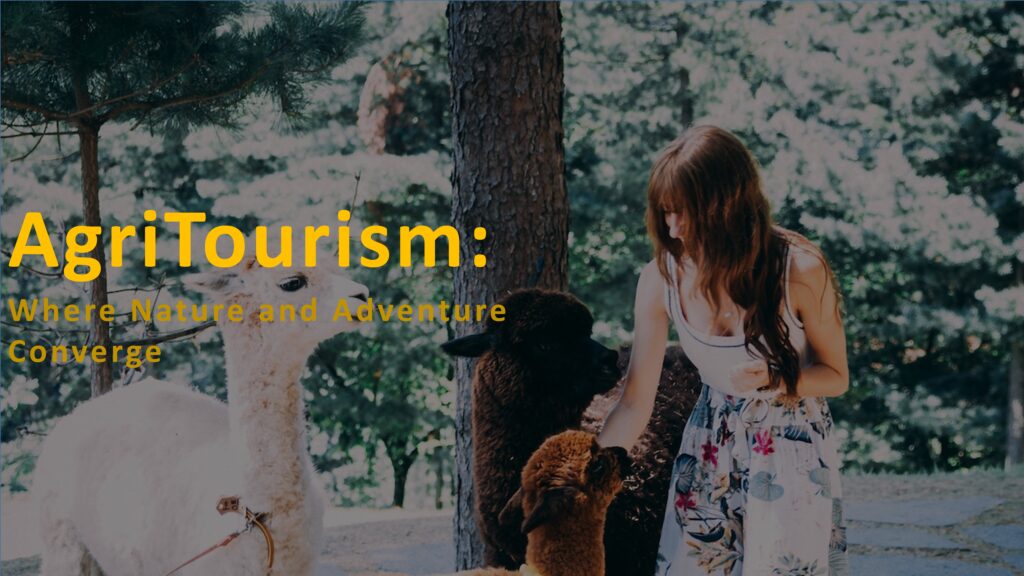
Ever thought about swapping city bustle for farm life? That’s agritourism! It’s like a farm-fueled adventure. Imagine picking fruits, exploring fields, and getting cozy with nature. This isn’t just any trip. It’s a chance to breathe farm air, taste fresh treats, and make stories you’ll share forever. Ready to dive into the world of agritourism? Let’s roll!
Section 1: The Essence of Agritourism
What is agritourism.
Agri-tourism, also known as nature-centric tourism or Rural Tourism is when people visit farms and rural places to have fun and learn. It helps teach about things like the environment, food, and safety. It is a type of sustainable tourism .
The International Agri-tourism Society defines AgriTourism as “ The set of activities through which people seek out direct contact with agricultural systems so they can see them in practice or learn about them.”
According to the 2017 Census of Agriculture , 28,575 farms offered agritourism and recreational services resulting in $949 million in sales. In addition, direct-to-consumer sales brought in $2.8 billion in sales for 130,056 farms.
Core Principles of AgriTourism
Agritourism has some important rules that make it special. These are its core principles. These principles help guide how agri-tourism works and why people enjoy it.
- Nature Connection: Agri-tourism is all about getting close to nature. People want to feel the fresh air and see the open spaces. They also want to learn how farms and nature work together.
- Learning by Doing: In agri-tourism, you don’t just read or listen – you do! You touch the animals, plant seeds, and harvest crops. Learning by doing makes the experience fun and memorable.
- Farm Education: People come to AgriTourism to learn about farms, animals, and food. Farms are like outdoor classrooms where you discover how things grow and where your meals come from.
- Enjoyment for All: Rural tourism is for everyone – families, friends, and even solo travelers. It’s a chance for everyone to have a good time, relax, and explore the farm life.
- Supporting Farmers: When you do nature-centric tourism, you help farmers too. They get to share their work, and you support them by buying local products and enjoying their hospitality.
- Preserving Tradition: Rural tourism helps keep farming traditions alive. By experiencing farm life, you understand the hard work farmers do and why it’s important to keep these traditions going.
- Creating Memories: Agri-tourism gives you stories to tell and memories to cherish. It’s not just about the things you do, but the experiences you share with others.
Remember, these principles are like the guidebook for agritourism. They explain why it’s exciting, educational, and enjoyable all at once.
How Does Agri Tourism Work?
Agri tourism operates by bringing together three important things: agriculture, tourism, and the charm of rural places. It’s like a puzzle where each piece fits perfectly to create a wonderful experience.
Connecting Agriculture, Tourism, and Rural Appeal:
Agri-tourism connects the dots between farming and traveling. People are drawn to the calmness and beauty of the countryside. They want to explore farms, learn about crops and animals, and understand how nature plays a role in our lives.
Hands-On and Immersive Experience:
What makes agri tourism special is that it’s not just watching – it’s doing! You can touch the wool of sheep, pick ripe fruits, and feel the soil in your hands. It’s like becoming a part of the farm, getting involved, and experiencing farm life firsthand.
Getting Involved:
Agri tourism invites you to roll up your sleeves and be active. You might help with planting seeds, feeding animals, or even making cheese. It’s not just about seeing things but also participating and learning through action.
Learning Through Fun:
Imagine learning where your food comes from while having fun. That’s agritourism! You can milk cows, gather eggs, and see the work that goes into producing what we eat. It’s an educational adventure that keeps you engaged and excited.
Family-Friendly Adventure:
Agrarian tourism welcomes everyone, from kids to adults. Families can bond while exploring farms and sharing new experiences. It’s a chance for kids to see farm animals up close and understand the journey of food from field to table.
Supporting Local Economy:
When you do agrarian tourism, you support local farmers. You might buy their fresh produce or homemade goods. This helps the local community thrive and keeps the farming tradition alive.
Remember, agri-tourism works like a bridge connecting farming, travel, and learning. It’s about being hands-on, getting close to nature, and having an unforgettable adventure.
Section 2: Nature’s Bounty: Exploring Farms and Landscapes
Agritourism takes you to places with stunning countryside views. Picture green fields, rolling hills, and clear blue skies. These landscapes offer a break from the city hustle, giving you a chance to relax and breathe in nature’s tranquility.
When it comes to options, visitors have got a spectrum of choices to explore during agri-tourism. There are vineyards where grapes for wine grow, orchards filled with fruits like apples and peaches, and animal farms with cows, chickens, and goats. Each farm tells a unique story of how food is grown and nurtured.
If you want to take your experience to the next level, a guided tour is the most effective one. Guided tours and activities are the keys to discovering nature’s gifts. On guided tours, you’ll walk through vineyards, see fruit trees heavy with ripe produce, and greet farm animals. Activities might include picking berries, making cheese, or tasting freshly pressed juice.
Guided tours come with experts who explain how things work. They’ll teach you about the farming process, the care that goes into each crop, and the significance of sustainable farming. It’s a chance to learn while surrounded by the beauty of nature.
Agri-tourism isn’t just about sightseeing; it’s also about savoring flavors. You might get to taste wine made from the grapes you see, try freshly picked apples, or enjoy a farm-to-table meal using ingredients right from the fields.
By visiting these farms, you’re also helping to preserve the natural beauty of rural areas. Farms are part of the ecosystem, and when you learn about them, you understand the importance of protecting the environment.
Section 3: Adventure Awaits: Thrills in Farm-Based Experiences
Agritourism isn’t just about calm fields – it’s about adventure too! Get ready for some excitement as you explore the fun side of farms. It’s like having a mini-adventure park right in the middle of nature.
Imagine zip-lining across fields, feeling the wind rush past you. Picture riding horses through scenic trails, surrounded by nature’s beauty. Or maybe hiking up hills and taking in breathtaking views. Agro-tourism properties offer all these exciting activities and more.
These adventure activities don’t take away from nature – they actually make it better! Zip-lining lets you soar over trees and streams, horseback riding takes you closer to animals and natural trails, and hiking lets you conquer new heights while enjoying the scenery.
Whether you’re an adventure enthusiast or just looking to try something new, farm-based activities have something for everyone. It’s a chance to step out of your comfort zone and experience the best of nature and excitement together.
Remember, farm-based travel adds a splash of adventure to nature’s beauty. It’s about having fun, feeling the rush, and learning as you go. So, gear up for some farm-based thrills that will make your visit unforgettable!
Section 4: Farm-to-Table Delights: Culinary Adventures
Agri-tourism isn’t just about farms or adventures – it’s about food too! Get ready to embark on a delicious journey that connects you with the flavors of the land. It’s like exploring a whole new world of tastes right where the ingredients are grown.
Imagine sitting down to a meal where the ingredients were plucked right from the fields you explored. Agri-tourism offers farm-to-table dining, where you taste the freshest produce, meats, and dairy, all prepared in unique and mouthwatering ways.
Want to learn how to cook with farm-fresh ingredients? Agri tourism offers cooking workshops where you can learn recipes using what’s in season. There are also tasting sessions where you can sample cheeses, jams, and wines made on the farm.
The best part about farm-to-table dining is the freshness. Ingredients travel a short distance from the farm to your plate, so you can taste the difference. Plus, you get to try things that might not be available in regular stores.
When you cook and eat what’s grown on the farm, you connect with the land and the people who nurture it. You understand the care that goes into each ingredient, and you appreciate the journey from farm to your fork.
Farm-based foods often have a traditional touch. You might enjoy homemade bread, jams, and pies that carry the taste of old family recipes. It’s a chance to savor the flavors of the past while being in the present.
Cooking and eating farm-based meals create memories you’ll cherish. You might remember the laughter of the cooking workshop, the joy of trying something new, or the satisfaction of a meal well-enjoyed.
Section 5: Creating Lasting Memories: Accommodations and Interaction
Nature-based tourism doesn’t end when the sun sets – it continues with unique accommodations that let you fully immerse yourself in the farm experience. Imagine waking up surrounded by fields, animals, and the beauty of nature.
Nature-centric tourism sites offer a variety of accommodations. You might stay in cozy guesthouses with rustic charm, cabins nestled in the woods, or even set up a tent and camp right on the farm. Each option gives you a different way to connect with the land.
Staying on a working farm isn’t just about having a place to sleep – it’s about being part of the farm life. You might wake up to the sounds of animals, learn about daily farm routines, and experience the peacefulness of rural living.
Agri tourism accommodations aren’t just places to sleep; they’re places to interact. You might help feed the animals, assist in planting, or just enjoy the simple pleasure of being in the midst of nature.
The interactions you have while staying on a farm create lasting memories. Roasting marshmallows around a campfire, listening to stories from the farmers, or watching the stars above – these are moments you’ll carry with you long after your visit.
Staying on a working farm is like having a live classroom. You learn about the farm’s rhythms, the importance of sustainable practices, and the connection between food and nature. It’s an educational adventure that goes beyond books.
Farms offer a different kind of beauty – one that’s simple and authentic. Accommodations on agri-tourism sites allow you to appreciate this beauty up close, whether it’s the sunrise over the fields or the tranquility of a starry night.
Section 6: Benefits of Agritourism: Sustainability and Community Impact
As we delve deeper into the world of agritourism, it becomes evident that its significance extends far beyond leisure and adventure. The essence of agri tourism encompasses not only the enjoyment of rural landscapes and engaging activities but also a range of positive impacts on local communities, economies, and the environment.
In this section, we’ll uncover the remarkable benefits that agri-tourism brings to the table, emphasizing its role in supporting sustainable farming practices, fostering economic growth, and providing valuable educational experiences.
9 Best AgriTourism Destinations
If you’re wondering, “Where can I find agritourism near me?” look no further. In this exciting section, we’re taking you on a global tour of the 9 best agritourism destinations that promise to awaken your senses, satisfy your curiosity, and leave you yearning for more.
From the serene landscapes of Tuscany to the tropical allure of Hawaii, each destination holds a unique charm that beckons you to explore and indulge in the wonders of agri tourism.
1. Taiwan
Experience agritourism near you in Taiwan, where bustling city life meets the serene countryside. Wander through picturesque tea plantations, pick your own fruits, and savor local delicacies. Taiwan’s agri tourism offers a blend of tradition and modernity, letting you immerse yourself in both culture and nature.
2. Florida
Discover the enchanting world of agritourism in Florida, USA. From citrus groves to cattle ranches, Florida agritourism offers a diverse experience. Enjoy guided tours, explore farmers’ markets, and relish the tropical flavors that this sunny state has to offer.
3. Tuscany
Uncover the heart of agritourism in Tuscany, Italy. Amid rolling vineyards and charming olive groves, Tuscany’s agritourism invites you to relish exquisite wines, savor local cheeses, and immerse yourself in the rich history of Italian farming traditions.
4. Brazil
Experience agritourism in the vibrant land of Brazil. Wander through coffee plantations, explore tropical farms, and indulge in authentic Brazilian cuisine. Brazil’s agritourism lets you explore the Amazon rainforest, learn about sustainable farming, and enjoy a taste of South American life.
5. California
In California, agri-tourism takes you from the vineyards of Napa Valley to the fields of organic farms. Discover farm-to-table dining, participate in harvest festivals, and enjoy the diverse agricultural landscape that defines California agri-tourism.
6. Hawaii
Experience the aloha spirit with agritourism in Hawaii. Visit pineapple farms, learn about indigenous crops, and engage in traditional Hawaiian activities. Hawaii’s agritourism lets you connect with local culture while surrounded by breathtaking landscapes.
7. Philippines
Explore agritourism in the Philippines, a tropical paradise that offers rice terraces, fruit farms, and fishing villages. Discover traditional farming methods, taste exotic fruits, and engage with local communities to truly experience Filipino agritourism.
8. Abbey Road Farm Oregon
Embark on a unique agritourism journey at Abbey Road Farm in Oregon. Stay in converted silos, enjoy wine tastings, and immerse yourself in the farm’s laid-back atmosphere. This boutique destination offers a charming blend of relaxation and farm-based activities.
9. Greece
Delve into agritourism in Greece, where ancient olive groves and vineyards create a captivating backdrop. Enjoy olive oil tastings, explore traditional villages, and immerse yourself in the Mediterranean way of life through Greece’s agri-tourism offerings.
Agritourism Insurance
Agri tourism insurance plays a vital role in ensuring that both visitors and farmers are protected. This type of insurance covers various aspects, including liability, property damage, and even medical expenses, in case of unexpected incidents.
If a visitor gets injured during an activity or damages property, the insurance steps in to cover the costs. Likewise, if a farmer faces a legal claim due to accidents on their property, agritourism insurance helps shield them from financial strain.
Agri tourism insurance offers comprehensive coverage tailored to the unique risks of farming and tourism. It includes protection against accidents, injuries, property damage, and even events like weather-related cancellations. This coverage ensures that your agritourism venture is prepared for various scenarios.
Agri-tourism insurance isn’t just a financial safeguard – it’s a cornerstone of responsible and sustainable agritourism. By prioritizing safety and protection, you’re not only securing your business but also fostering a positive environment for visitors to enjoy and appreciate the wonders of agritourism.
As we conclude this journey through the world of agritourism, one thing is clear: the magic of farms, nature, and unforgettable experiences awaits. From the tranquil landscapes of Tuscany to the tropical allure of Hawaii, and the heartwarming hospitality of Abbey Road Farm, these destinations offer a kaleidoscope of sensations that will leave you longing for more.
But nature-centric tourism is more than just a vacation – it’s a connection. It’s about forging bonds with local communities, understanding the labor behind each crop, and savoring the flavors that tell the story of the land. It’s a way to support sustainable farming, promote local economies, and create memories that will last a lifetime.
So, whether you’re yearning to explore vineyards, ride horses through scenic trails, or savor farm-to-table delights, there’s an agritourism adventure waiting for you. Take the plunge, embrace the charm of the countryside, and immerse yourself in an experience that’s as enriching as it is exciting.
Ready to embark on your own sustainable farming exploration? Discover your next destination and create memories that will last a lifetime. Pack your bags, bring your curiosity, and let the journey begin!
- Culture & Lifestyle

- Madhesh Province
- Lumbini Province
- Bagmati Province
- National Security
- Koshi Province
- Gandaki Province
- Karnali Province
- Sudurpaschim Province
- International Sports
- Brunch with the Post
- Life & Style
- Entertainment
- Investigations
- Climate & Environment
- Science & Technology
- Visual Stories
- Crosswords & Sudoku
- Corrections
- Letters to the Editor
- Today's ePaper
Without Fear or Favour UNWIND IN STYLE

What's News :
- President requests Joshi's release
- Chhaupadi tradition
- On-site medicine testing
- Congress-UML partnership
- DFI investment
Govt begins pilot of agro tourism village
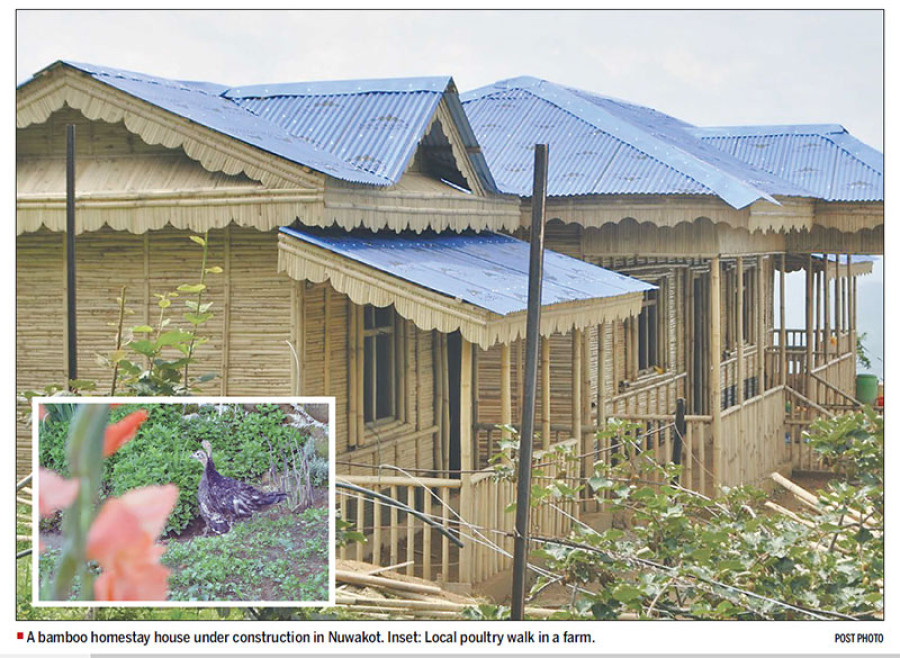
Heritage buildings, jungle safaris, adventure trekking and mountaineering are major tourist attractions in Nepal, but now, the government has piloted an agro tourism village offering vacations in farms to attract more tourists.
Few private firms like Banana Resort in Tikapur, Ostrich Nepal in Rupandehi and some tea farms in Ilam have been successful in establishing the agro tourism concept.
However, this is the first time the government has been promoting agro tourism. Agro tourism is a vacation in which hospitality is offered on farms where activities may include helping out and learning about farming, picking fruits and vegetables, fishing, testing local foods and enjoying traditional and local cultures. It gives tourists the opportunity to buy local produces. This activity helps to lift the socio economic condition of the rural areas by creating employment opportunities and additional markets for the rural products.
The Agriculture Ministry said that five community-based agro tourism villages would be developed this fiscal year in Machhamara in Sunsari, Ghodaghadi in Kailali, Patle in Solukhumbu, Rautamai in Udaypur and Kakani in Nuwakot.
The location of the agro tourism operation should ideally feature easy transportation facilities and have a good natural background. Normally, urban tourists are interested in enjoying nature and the rural life.
The agro tourism villages in the five selected areas involves 75 households. The government has launched the community-based agro tourism village for the first time targeting tourists who like greenery, quiet and calm natural environment, said Shankar Sapkota, deputy spokesperson of the ministry.
“It has been piloted in five areas and the number will be increased gradually if it becomes successful.” The project has been implemented by Vegetable Development Directorate under the Agriculture Ministry.
The government will promote the agro tourism as “Modern Green Tour Village” and under the programme, each selected firms will receive grant of Rs2.5 million to develop basic infrastructure like sanitation, roads and upgrading the quality of accommodation in the areas where the programme will be implemented.
The selected five firms have been given a deadline to complete the infrastructure by this fiscal year, ending mid-July. However, some firms said that it was difficult to complete the project within the given deadline due to monsoon. “We have selected more than 80 houses to run homestay under the project but we are facing difficulties to complete them on time,” said Jibnath Subedi, propritor of Friday Homestay and Oragnic in Nuwakot that is promoting kiwi fruits. Subedi said that the project has partnered with a number of houses that were damaged during the 2015 earthquake for homestay and they have been receiving the housing reconstruction grants.
“Apart from the houses, due to monsoon, it is difficult to transport goods and develop other infrastructure.”
Subedi, however, said that if the government extended the deadline until September, he could complete the project. Tourist movement also begins after September. The firms that have received the grant are monitored by the Agriculture and Finance ministries.
Related News

Tattva Farms launches flavoured jaggery in the market
Citizens bank launches fonepay credit card.

Investment from DFIs crucial for Nepal’s graduation
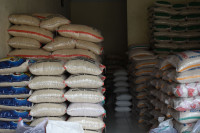
Rice prices hit record high amid Indian ban
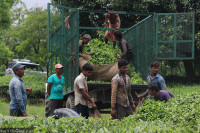
India stops tea-laden Nepali trucks on border for lab tests
.jpg&w=200&height=120)
Nepal sets sight on multi-billion dollar LGBTIQ tourism market
Most read from money.

Nepal scientists confirm old remedy for armyworm

Thamel now open 24/7
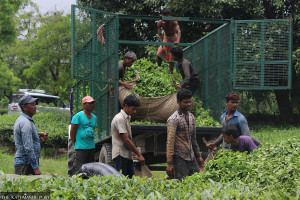
Escalating Middle East crisis threatens Nepali economy
Editor's picks.

Laws on marital rape still murky in Nepal
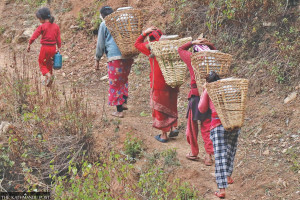
As springs dry up, water shortage deepens in high altitude villages of Mallarani in Pyuthan

Melodrama for monarchy
E-paper | april 24, 2024.
- Read ePaper Online
UN Tourism | Bringing the world closer

Product Development
- Rural tourism
- Gastronomy and Wine Tourism
- Mountain Tourism
- Urban Tourism
- Sports Tourism
- Shopping Tourism
share this content
- Share this article on facebook
- Share this article on twitter
- Share this article on linkedin

Rural Tourism
Rural tourism has a high potential to stimulate local economic growth and social change because of its complementarity with other economic activities, its contribution to GDP and job creation, and its capacity to promote the dispersal of demand in time (fight seasonality) and along a wider territory.
UN Tourism understands Rural Tourism as "a type of tourism activity in which the visitor’s experience is related to a wide range of products generally linked to nature-based activities, agriculture, rural lifestyle / culture, angling and sightseeing.
Rural Tourism activities take place in non-urban (rural) areas with the following characteristics: i) low population density, ii) landscape and land-use dominated by agriculture and forestry and iii) traditional social structure and lifestyle".

Best Tourism Villages by UN Tourism
With the vision of making tourism a positive force for transformation, rural development and community wellbeing, UN Tourism launched the ‘ Best Tourism Villages by UN Tourism ’ initiative.
It seeks to advance the role of tourism in valuing and safeguarding rural villages along with their associated landscapes, knowledge systems, biological and cultural diversity, local values and activities (agriculture, forestry, livestock and/or fisheries), including their gastronomy.
Tourism and Rural Development: Understanding Challenges on the Ground – Lessons learned from the Best Tourism Villages by UNWTO Initiative

Tourism and Rural Development: A Policy Perspective
Tourism and Rural Development: A Policy Perspective - Results of the UN Tourism Survey on Tourism for Rural Development to Member States

Compilación de buenas prácticas del turismo indígena – Enfoque regional sobre las Américas

UN Tourism Recommendations on Tourism and Rural Development

UN Tourism Recommendations on Tourism and Rural Development – A Guide to Making Tourism an Effective Tool for Rural Development
AlUla Framework for inclusive Community Development through Tourism

The Framework provides guidance and inspiration to all governments, as well as all other key stakeholders in the tourism sector – including regional and local governments, the private sector, industry associations, civil society, communities and tourists – with the aim of fostering a truly holistic and integrated approach to inclusive community development through tourism.
AlUla Framework for inclusive Community Development through Tourism
AlUla Framework for inclusive Community Development through Tourism – Executive Summary
International Rural Tourism Development – An Asia-Pacific Perspective

International Rural Tourism Development – An Asia-Pacific Perspective

Agritourism Is the Concept of Vacationing on a Farm—Try It Out at These 10 Pastoral Properties
The terms "agritourism" and "farm stay" are often used interchangeably. Whatever vernacular you assign to the purpose-built experience, though, know that this booming part of the ecotourism sector delivers something from which so many of us could benefit: more time outside, and the opportunity to experience an agrarian way of life. And it appears to be here to say: According to market research , the nearly $6 billion market size of agritourism, as of 2021, is predicted to grow at a rate of 11.4 percent through 2030.
“Agritourism is becoming so in demand because of our collective desire to return to a slower, more natural way of life. It ultimately comes down to our well-being." —Peyton Cypress, Farm Manager, Southall
“Agritourism is becoming so in demand because of our collective desire to return to a slower, more natural way of life. It ultimately comes down to our well-being. What environment is going to make us feel our best? When people start asking themselves these types of questions, many arrive at the idea of a farm with fresh air and beautiful scenery,” says Peyton Cypress , Farm Manager at Southall , in Tennessee. It’s also increasingly popular as a family vacation that teaches kids the importance of agriculture and treating Mother Nature with respect and, of course, lets them interact with adorable animals.
{{post.sponsorText}}
Agritourism is within the nature-centered-vacation canon of glamping , treehouse hotels , and immersive nature experiences , but with more of a focus on getting your hands dirty and learning practical skills in a rural setting. Unlike other types of nature-oriented tourism that are curated to fulfill a vacation fantasy, the agriculture component is the foundation of a true agritourism, and the tourism aspects come second.
That means chores need to be completed—whether that’s feeding chickens, milking cows, pulling weeds, or harvesting crops—and guests have the option to join in, whether by collecting your own eggs for breakfast or pulling potatoes from the ground to make dinner. Hard work also has plenty of payoffs besides a sense of accomplishment—including the serotonin-boosting benefits of getting in touch with nature and animals , seeing where your food actually comes from (maybe even having a hand in that process), and escaping the tech-fueled daily grind.
Farm stays don’t tend toward the super luxurious (with a few noteworthy exceptions). But that doesn’t necessarily mean you’ll be sleeping in a barn alongside barrels of hay on an agritourism trip. Most places offer comfortable accommodations, ranging from modest rooms with shared bathrooms to beautifully decorated farmhouses. Guests typically also have access to eco-conscious activities (like foraging and horseback riding), farm-to-table dining, and, in some cases, even sustainable spa treatments
If you’re ready to roll up your sleeves, get to work, and reap the myriad rewards, you might be interested in learning about 10 pastoral properties around the world that stand out in the ever-growing field of agritourism—and will surely plant the seed for your next nature-driven getaway.
10 agritourism farms around the world to know about
1. liberty hill farm (rochester, vermont).
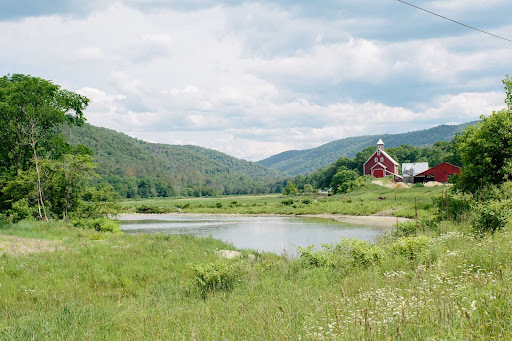
Vermont's first green agritourism enterprise, Liberty Hill Farm , a family-run dairy farm in the picturesque town of Rochester, has been welcoming tourists for nearly 40 years, many of whom return many times over to milk cows, bottle-feed calves, and go hiking in Green Mountain National Forest. The hearty breakfast of farm-fresh eggs and cheese, as well as a home-cooked dinner keep agritourists properly fueled. After a day filled with outdoor activities, guests can watch the sunset from a rocking chair on the porch and catch some quality zzzs in a cozy room inside the 1825-built Greek Revival main house.
2. Beach Plum Farm (Cape May, New Jersey)
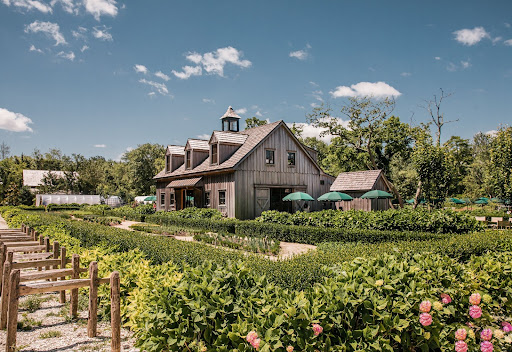
Drive two miles west of historic downtown Cape May and you’ll find Beach Plum Farm . To reap grounding benefits of fostering a deeper connection to nature and farm life, chores here include feeding animals, collecting eggs, planting, and harvesting. There are interactive classes on topics such as beekeeping and flower-arranging in season. The property is also well known for farm-to-table dinners. Besides hands-on educational experiences, enjoying the fresh air, and eating delicious food, guests have the opportunity to snooze soundly in cottages and hemlock beam barns.
3. Babylonstoren (Simondium, South Africa)

One of the oldest Cape Dutch farms in South Africa, Babylonstoren has a huge garden with vegetables, stone fruits, citrus, herbs, and even a prickly pear maze. Gardener-led walking tours to see the plants, bees, ducks, and chickens are available.
Babel, an old cowshed turned farm-to-fork restaurant, boasts one of the best and most bountiful breakfast spreads ever. Expect house-made granola, wood-fired country bread, hand-churned butter, pressed juices, and hyperlocal honey. Guests can hunker down in cottages with fireplaces and clawfoot tubs. Bathrooms here are stocked with hand-picked aromatherapy herbs. And nature-driven spa treatments round out the wellness offerings.
4. Southall (Franklin, Tennessee)
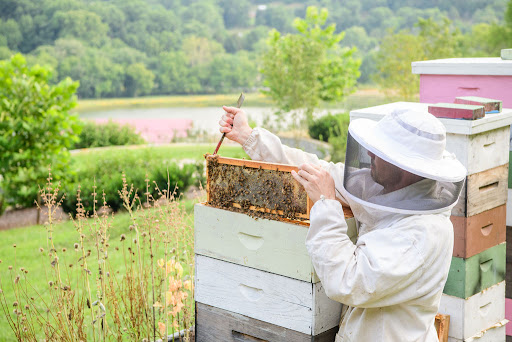
For travelers who crave a little luxury, Southall is an upscale farm resort not too far outside of Nashville worth checking out. The picturesque property offers gardens, greenhouses, a lake, apiaries, forest trails, and refined accommodations that make it an extremely relaxing atmosphere for stressed-out city dwellers to learn about and reconnect with nature. The farm-to-table experience ranks among the highlights for foodies keen to understand the journey from ground to plate—and then taste the proverbial fruits of their labors, as prepared by a talented chef. Many folks also gravitate toward pollinator programming that includes bee-hive tours and honey tastings.
5. Beltane Ranch (Glen Ellen, California)

Sonoma continues to lead the regenerative agriculture charge in the United States. Beltane Ranch , a sixth-generation operation in Glen Ellen, stands at the forefront of the movement. Efforts—which go well beyond sustainably to restorative practices that will benefit the land for generations—include using free-range chickens for pest control, composting initiatives, maintaining wildlife corridors, planting cover crops, and employing sheep (aka “woolly weeders”) to promote soil fertility. Besides the applaud-worthy ecological endeavors, this 105-acre agricultural preserve is a wonderful place to unwind under the shade of ancient oaks, stroll through the vineyards and heirloom gardens, sip estate-grown wine, sample olive oil, and rest in a landmark inn.
6. São Lourenço do Barrocal (Alentejo, Portugal)

Another plush yet pastoral choice, São Lourenço do Barroca is a family-operated agritourism that dates back more than 200 years. The sprawling plot comprises a 19th-century farmhouse, spa, stables, scenic trails, a winery, an organic garden, and a farm-to-table restaurant that sources vegetables, fruits, and olive oil grown and produced right on-site. Guests have the opportunity to participate in a spate of activities, such as horseback riding, cycling, bird-watching, and stargazing (the estate sits within the Alqueva Dark Sky Reserve ). Overnight options include rooms, suites, and cottages—all refurbished, but still true to traditional craftsmanship with elements like terracotta floors.
7. Tabula Rasa Farms (Carlton, Oregon)
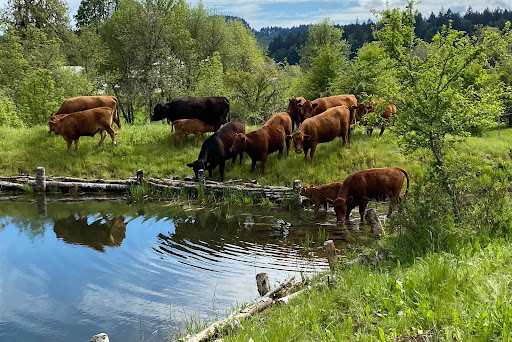
Situated in the heart of the Willamette Valley, Tabula Rasa Farms is rooted in sustainability and respect for the land and its creatures. It’s well regarded for humane, grass-fed beef, heritage-breed pork, and pasture-raised laying hens. The plant-based set will find plenty to satisfy thanks to the regenerative approach to agriculture that yields fresh, flavorful vegetables. Farms tours to meet all animals, learn about rotational grazing, and witness water conservation efforts first-hand are a huge hit. For overnight guests, there’s a hilltop farmhouse with sweeping vistas and a fitness center.
8. EBBIO (Tuscany, Italy)

EBBIO , an organic and sustainable farmhouse surrounded by an evergreen forest in Tuscany, is beloved among visitors who love foraging for wild asparagus and edible flowers. Truffle hunts lure travelers between September and November. With essential-oil making, cooking classes, jam workshops, art therapy, horseback riding, and farm chores like feeding chickens, the enriching on-site activities never seem to end. The ecologically oriented estate also hosts yoga retreats.
9. Mountain Goat Lodge (Salida, Colorado)
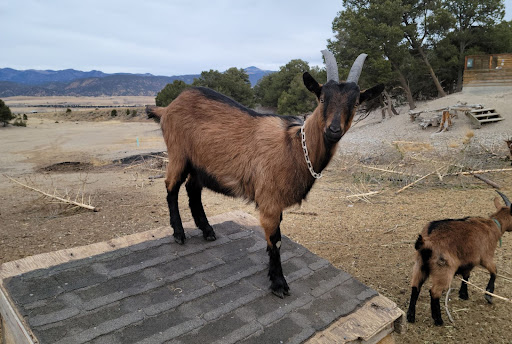
Tucked away on 20 acres at the foot of the Sawatch Mountain Range in the high desert of Colorado, Mountain Goat Lodge invites visitors to interact with dairy goats (and even bottle-feed kids). More than just simply looking adorable and bringing a smile to guests’ faces, these cute critters supply milk for housemade Greek-style yogurt, chevre, fresh mozzarella, feta, and paneer—all of which is up for grabs at breakfast. The cheese-making workshops are wildly popular. Guests can also learn new skills to bring back home by taking classes on raising backyard chickens and goat husbandry. When it’s time to call it a night, cozy rooms and suites await.
10. Cucumbi Farm (Alentejo, Portugal)
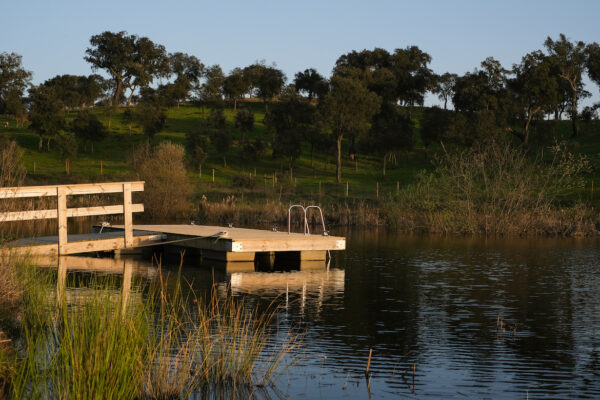
A soulful reflection of the agrarian roots and spirit of Alentejo, every aspect of Cucumbi Farm ties to the untouched region it calls home. It’s rustic and relaxing, with an emphasis on returning to simplicity. There are expansive fields to explore, crops to harvest, sheep and chickens to feed, and a saltwater pool to cool off in between chores and strolling the enchanting grounds. While the whitewashed apartments and suites—which don’t have TVs in order to help guests fully embrace the slower pace and unplugged nature of things—are all named after animals that reside on the herdade.
Loading More Posts...
The Beach Is My Happy Place—and Here Are 3 Science-Backed Reasons It Should Be Yours, Too
Your official excuse to add "OOD" (ahem, out of doors) to your cal.
4 Mistakes That Are Causing You to Waste Money on Skin-Care Serums, According to an Esthetician
These Are the Best Anti-Chafing Denim Shorts—According to Some Very Happy Reviewers
{{ successMessage }}
Please wait a moment...

Nigeria Launches First Agrotourism Village in Oyo State
from olubunmi osoteku and rukayat ojo, ibadan .
Nigeria has made history in the Agro tourism Sector as the country has held the ground-breaking and foundation-laying ceremony of the first Nigerian Agro tourism Village project, located in Oyo State.
The project, inaugurated by the Presidency, through the Office of the Secretary to the Government of the Federation, is an initiative of the World Agro Tourism Organisation, in partnership with the Catholic Archdiocese of Ibadan and the Offer Center Institute of Agriculture, to train and empower about 2 million youths in Nigeria and establish the Agro tourism Village in the six geopolitical zones of Nigeria.
The ground-breaking and foundation-laying ceremony to launch the International Agrotourism Pilot project for the Southwest Zone of Nigeria was held at the location of the Agrotourism Village, Lanlate Youth Camp Initiative, Itabo Community, Ibarapa East Local Government Area of Oyo State.
The President, World Agro Tourism Organisation, Trust Henry-Ogboi, explained that the initiative is a combination of agriculture and tourism, a new reform in the agriculture and tourism sectors that is all-encompassing, reiterating that when it commences, the village would be a hub for agro-business and agro-technology for young Nigerians.
Henry-Ogboi noted : “The project is about agricultural hubs, industrial hubs, tourism, recreation, farm estate, and training center for skill acquisition to train youths. This project is coming not at a better time than when the president declared a food security emergency in Nigeria.
“This place is not a planting center but to help farmers get returns on investment. So, there’s going to be more of an industrial zone here for every farm produce. With that I don’t think we’re going to have a problem with marketing again in agriculture within the Southwest Zone,” he disclosed.
In his opening remark, the Director, of Lanlate Youth Initiative, Rev. Fr. Bernard Azeez, harped on the importance of the event, saying the 500 hectares of land donated by the Catholic Archdiocese of Ibadan is aimed at engaging young minds in the area of agriculture and to also support the Federal Government’s plan to diversify the economy of the country.
Azeez stated: “There’s a lot of challenges facing agricultural development in the country. The first is shifting attention from oil to agriculture. Another is trying to convince the youths of today that agribusiness is lucrative enough in comparison to other white or blue-collar jobs. The part of the training and empowerment we must do is to ensure that the story is changed.”

On her part, the Permanent Secretary, Federal Ministry of Agriculture, represented by Mrs Florence Akulo, said the foundation-laying ceremony is symbolic and aligns with the objective of restructuring and securing the sustainable agritourism sector in Nigeria for sustainable development and attainment of food security.
Speaking on behalf of the community, the Balogun of Itabo Land, Olusegun Adeosun, implored the organisers to expedite activities at the Agrotourism Village so that indigenes of the community could benefit.
He said: “We have listened carefully to what has been said and all the plans stated here are so eye-catching and we can’t wait for the village to start up so that our people can benefit from the project. We also want to call on the Federal Government to construct roads for easy access to the community.”
Also, present at the event were the Comptroller-General, Nigeria Correctional Service, Alhaji Aliru Nababa, represented by ACG. Abimbola Ogunyemi and the Commandant-General of the Nigeria Security and Civil Defence Corps(NSCDC), Dr Abubakar Audi, represented by Deputy Commandant Raji Atanda, among others.
The highlight of the event was the planting of cashew seedlings by stakeholders present, to signify the beginning of the project, and the presentation of the Street Drive Award to all the Military and Para-military agencies in the country.
Dominica Nwabufo
Greener City: Lagos State Government Tasks Residents on Tree Planting
Kaduna State Assembly passes two Bills
Ministry trains rice farmers on seed production to increase yield
Environment Ministry seeks more Financial Mobilisation
Kwara State Government confiscates suspected poisoned beef, fumigates, shuts abattoir
Governor’s Wife Advocates Revival Of Home Gardens For Sustenance
Leave a Reply
Your email address will not be published. Required fields are marked *
What is Agritourism? 15 Reasons to Love Agritourism

I may earn income from affiliate links or partnerships in this post. I spend time to curate tours or products that align with my values. Thanks for supporting my work, at no additional cost to you.
Last updated on June 29th, 2023 at 02:44 pm
H ave you heard of agritourism, otherwise known as agricultural tourism, agro-tourism, or farm tourism? Whether you are familiar with the term or just hearing about it for the first time, you might be curious to learn more about agritourism. Agritourism can help align your travels with sustainable tourism principles while simultaneously revitalizing rural economies and deepening your cultural connections while traveling.

Likely, you’ve already participated in agritourism, but you might have no known what agritourism was at the time. Agritourism includes tourism activities on rural agricultural lands, such as U-Pick farms, corn mazes, camping among vineyards, or staying in a bed-and-breakfast farmhouse with a local host. While not an entirely new concept, agritourism plays an increasingly important role in diversifying and revitalizing rural economies, connecting people with rural culture and traditions, and fostering sustainable tourism.
In this comprehensive guide to agritourism, I’ll answer “what is agritourism?” by exploring different types of agritourism in practice, reviewing tips for sustainable agritourism, exploring some of its benefits with 15 reasons to try agritourism, and diving into how to plan your next adventure! Also, be prepared for lots of photos of wine and vineyards – I don’t know why, but I seem drawn to wine agritourism the most. I mean, who doesn’t want to drink amazing wine you can’t find on any shelf, while stuffing your face with local cuisine, connecting with locals, and looking at these stunning views??

Make sure you read the following articles, which provide more context into some of the terms described in this post:
- Learn about sustainable tourism’s three pillars
- Unpack economic leakage in tourism
WHAT WE’RE COVERING
What is Agritourism?
Importance of Agritourism
Sustainable Agritourism
Examples in Practice
15 Reasons to Love Agritourism!
Discuss and Share
- Agritourism is tourism activities that happen on a rural farm, orchard, vineyard, or another agricultural venue.
- They include things like farm stays, wine tastings, honey sampling, or berry picking farms.
- When conducted properly agritourism is a great sustainable travel option.
- It can create economic diversification for farms, foster cultural connections, and help connect people with agriculture and the natural environment.
What is Agritoruism?
Agritourism happens worldwide – from the rolling grapevine-filled hills of Tuscany to the cheese producers of Franche-Comté, the corn fields of the midwest United States, The Australian Bushlands, the rice fields of Bali, the coffee farms of Karnataka, and township farms in South Africa.
Each of these regions likely has its definition of agricultural tourism, but there are common elements that can help us understand agritourism. Essentially, agritourism is the intersection of tourism and agriculture. Rural landowners invite visitors to engage in activities, such as camping, wine tastings, or berry picking on their farms, ranches, orchards, vineyards, etc., to generate extra revenue and diversify in a changing climate.

Agritourism can be part of local tourism, which would involve a day trip out to a nearby pumpkin patch. Or, it can be an aspect of international tourism, like traveling to another country to visit their vineyards. Both options greatly impact smaller communities and positively create cultural connections.
To be sustainable, agritourism should involve education and be conducted mindfully to connect visitors with food production and rural culture and incentivizes sustainable farming practices.

Rural tourism and agritourism go hand-in-hand as many people who visit agricultural areas will pass through or stay in nearby rural nature or towns. Some experts identify the main components of agritourism that contribute to the three pillars of sustainability as:
- Participating in traditional agricultural activities without damaging the surrounding natural environment (Environmental).
- Paying to engage in activities such as berry or fruit picking, ranch experiences, sampling honey, wine tastings, supporting roadside produce vendors, or attending festivals and events like Halloween at a pumpkin patch (Economic).
- Extending your visit to stay overnight in a farmhouse, bed and breakfast, or camping on unused land (Social and Economic).
- Interacting with the landowners or agricultural laborers in exchange for a cultural and educational experience that connects non-farmers to food sources (Social).

Agritourism has been common in Europe for decades. Those on pilgrimages and early tourists stopped at rural monasteries and farms to enjoy in-house beers and delicacies. The trend is increasing in North America and Europe, with an increasing interest in pumpkin patches and cultural heritage tourism.
Why is Agritourism Important?
Agricultural communities and workers are under pressure in a changing landscape. In the era of globalization and urbanization , agricultural communities grapple with decreasing populations, low profitability, distrust in food production, and over-reliance on diminishing government funds.

Many agricultural businesses and owners are responding by expanding into new markets to survive these challenges and changes. With tourism proving itself as a global economic powerhouse , the merger between tourism and agriculture seems like a practical path forward to diffuse mass tourism and support agriculture businesses. Smaller, high-cost producers can use tourism to help stabilize their revenue while connecting urban residents with rural life with environmental and food-related education. Beyond the economic importance, agritourism plays a role in cultural preservation by providing value to traditional lifestyles and customs.
Sustainability and Agritourism
Agritourism is considered a form of alternative tourism or a tourism activity that falls in the same realm as sustainable tourism. However, that doesn’t make agritourism sustainable by default. You, as the traveler, can take steps to ensure your next agritourism adventure checks boxes for all three pillars of sustainable tourism.
Environmental
Support eco-farming practices.
Do your research before you visit a farm, vineyard, orchard, or other agricultural business, and check if they follow an eco-friendly farming ethos. As someone who regularly visits vineyards, I will often review their website and look at their growing practices. I look for keywords like bio, organic, sustainability, and eco-friendly farming.
I support farms and agricultural businesses that consider the environment by avoiding chemical pesticides, engaging in regenerative community-based practices, and growing food that aligns with the local ecology and seasonal climate.

If you are a meat eater, look for places that are mindful of how they treat the animals considering their living conditions, welfare, and diet.
An example of what I would consider a farm that goes above and beyond in its environmental consideration is Lowe Family Wine Co. in Mudgee, Australia. Take the time to read Lowe’s farming practices and environmental commitmen t to understand best practices for agritourism.
Be respectful of the environment
You know the drill, respect the people and places you visit. Make sure you don’t leave behind waste or rubbish; bring your reusable water bottle and all that jazz.
Don’t pick, collect, trample, or harvest outside designated areas.
Keep a safe distance from animals and do not feed them unless you are in a place where interacting with them is monitored with food provided by the farm.

Another idea is to see if you can take public transportation to the farm. Catching the bus or finding a train connection is a great way to reduce your impact on the natural environment. If you’re on a road trip like Ganesh and I often are, can you keep the car parked once you arrive at the farm? We always bring or rent bikes and prefer to explore the surrounding region by bike – we explored all of Bordeaux by bike – it was a great way to reduce our impact!
Explore nearby nature
Rural farms are often located nearby or inside stunning natural landscapes that are well worth exploring. For example, you might enjoy a scenic hike through the German alps to indulge in bergkäse – the delicious mountain cheese made on Bavarian alpine farms.

Immersing yourself in local nature gives you insight into the cultural importance behind the agricultural delights. Take an extra day to go for a hike, view the birds, go for a bike ride, or sit on a bench and enjoy the scenic views around you.
Declare yourself!
Most international airports will ask you to declare if you’ve been to a farm, interacted with livestock, or engaged in other agricultural activities. It is crucial to be honest on these forms and declare yourself if needed.

I spent some time participating in agritourism in rural Brazil, and as I re-entered the U.S., I had to declare myself. It wasn’t scary; I just had to go through a special cleaning with my hiking boots. Invasive species can spread through seeds that stick to your boots, and livestock on farms can carry certain diseases that can transmit to humans. Declaring yourself can help prevent the spreading of diseases, pests, and invasive species commonly located on farms and in livestock. I think we all know by now we do not want another pandemic on our hands…
Take the time to learn
Even if you are stopping by the local orchard to pick some apples, take a minute to learn something! It could be as simple as what types of apples are grown in the area and if they are at risk from climate change or pests. What is unique about the geology and climate that makes apples in this region so great? Why is apple farming so crucial to the economic vitality of the region? What is the cultural significance of apples in the area? To find out all this information, look for information pamphlets or ask the local staff to help educate you!

Engage with the owners/workers
On that same note, take the time to connect with the owners and workers on the farm. When we camped on a vineyard in Italy, we made sure to chat (with lots of gesturing) with our lovely host as she made authentic home-cooked pasta. We learned a lot about the cultural significance of agriculture in Tuscany. Another time as we were in rural France camping at (you guessed it, a vineyard), we chatted with the owners, discussing the impact of climate change on wine production in Bordeaux. Before you leave, don’t forget to thank and appreciate your hosts for inviting you to share their livelihood and craftsmanship with you.
Reduce Tourism Leakage
When visiting a local farm, it is pretty easy to reduce your tourism leakage. But, as a general rule of thumb, seek out more minor local agricultural producers to stop the leak. Read my guide on tourism leakage for an in-depth dive into this concept.
Buy low-impact gifts
Taking a souvenir home from your agricultural farm visit is a great idea! To ensure it is a sustainable gift , stick to consumable items that highlight the region’s craft – locally sourced organic olive oil, a bottle of wine, organic jam, or even just a basket of strawberries in a paper carton all great ideas.

If you can, avoid plastics, cheaply made trinkets like stuffed animals, or plastic Christmas decorations. What you take home should value the local artisans of the region. I love bringing home artisanal delicacies because I can invite my friends over and share all the amazing things I learned during my agricultural stay over a good meal.
Stay a while
Day trips are great, but can you stay overnight? Spending a night or two on location significantly boosts the economic contribution of your stay and the educational aspect. You will have the opportunity to dine on local cuisine and appreciate the surrounding nature. How much time should you stay? Staying at least one night has a huge positive impact. Some places may ask you only stay for 1-2 nights to ensure more people have the opportunity to visit and purchase goods. Other places will be delighted for you to stay for a whole week. Trust your gut and stay as long as possible to feel like you’re walking away having made an impact.

Agritourism is popular in the Mekong Delta , but research shows that most people stay only for a short time, thus not spending much money resulting in low sales, little economic benefit, and a decline in the cultural authenticity of tourism activities.
Go as rural as possible
According to the USDA , large establishments near urban areas record higher numbers of agritourism revenue than smaller rural farms. To maximize your benefits, seek out small, local, and family-owned options away from the city.

Agritourism in Practice
Agritourism occurs in rural areas worldwide, with many diverse activities. Some of the most well-known are pumpkin patches and corn mazes around the United States. However, many examples of agritourism foster a slow travel mentality, where you can stay on a farm for a few nights and truly immerse yourself in agricultural practices.

One of my favorite experiences was camping at a vineyard in Tuscany. Ganesh and reserved a spot for our campervan among the vines and lavender bushes of the rolling hills of Tuscany. Every evening we would join the other guests and sit on the large terrace of our host’s home to enjoy a home-cooked meal and the sunset of the grapevines. The owners would make us authentic handmade pasta and pair it with a selection of their delicious wines. We stayed for several nights, ensuring we had the opportunity to learn about Italian wine production, sustainability, and cuisine (social and environmental). We also spent lots of money on wine and olive oil (economic).

France Passion is another example of excellent agritourism in action. Ganesh and I used the France Passion network during our campervan trip in 2021. We would stay on farms in places like Bordeaux and stock up on wine after an educational wine tasting (economic and environmental). During the day, we would ride our bikes and visit important cultural sites in smaller towns (economic and social). The France Passion network allowed campers and road-trippers a safe and comfortable place to sleep at night while boosting the economy of smaller communities.
15 Reasons to Love Agritourism
If you’re not convinced that agritourism is right for you, then I am sure these 15 reasons will make you fall in love with agricultural tourism.
1. Boost Agricutlrual Revenue
In an era of increasing urbanization, or people moving away from rural areas into urban zones, many rural communities struggle with a declining economy and population. Many of the younger generations will leave town in search of high-paying jobs. However, the rise in agritourism can provide an economic boost to both farms and the surrounding community by luring people in with higher-paying jobs.
In the United States, revenue from agritourism ventures was $950 million in 2017, providing some farms more than 5% of their total revenue . This number is much higher in developing economies or for small producers. Many small producers in the Mudgee wine region discussed how tourism transformed their business. Previously they would only sell grapes to larger wineries, but with increased tourism, they could sell their own bottled wine directly to consumers increasing and diversifying their income streams.

When I was in India, we visited the coffee farms in Karnataka. As these farms opened their doors for coffee tastings and tours, we took advantage of sampling some fresh-roasted Indian coffee. This was an excellent way for these plantations to boost revenue.
2. Support Economic Diversification
As farms and agricultural ventures incorporate tourism into their business plans, they require more skilled workers in various jobs. For example, if a farm begins to host events like hay rides or olive oil tastings, it may hire an event planner or a marketing expert. These jobs often appeal to former residents of the small town that may have left to obtain degrees and higher-paying jobs in urban areas.

When I was in the Okanagan Valley in Canada, we went to a family-owned vineyard that had diversified, opening a restaurant and gift shop. They also offered wine-tasting courses, hosted weddings, and offered walking tours through the vines. They mentioned several family members had returned to work in the family business as they were interested in marketing, management, customer service, or event planning.
3. Revitalize Rural Communities
Agritourism can breathe new life into nearby small towns. As more tourists visit farms and rural areas, they also require services such as cafes, restaurants, shops, and other attractions. Many rural communities near farms see an uptick in art galleries, local boutiques, bed and breakfasts, and food and beverage venues.

Before we started a wine tasting on a small family-owned vineyard in Mudgee, we wanted some coffee. The winery’s owner sent us to the closest town to a small cafe. As we walked to the cafe, we noticed this formerly dying down was coming to life with new boutiques, shops, and coffee shops.
4. Value Tradition and Culture
The increased number of tourists can incentivize a revitalization of traditional handicrafts, art, and skills. We partook in Italy’s slow food cultural tradition while staying at a winery in Tuscany. Slow food is the concept of savoring traditional authentic, and local cuisine. Fast food chains, commercial restaurants, and busy urban lives can all contribute to the decline of traditional food culture. By staying in the vineyard and eating dinner on location every night, we provided value to the slow food tradition in Italy.

5. Support Diverse People in Business
Agritourism employment supports a diverse group of people. Traditionally, in some cultures, agriculture and labor might be male-dominated industries. The tourism aspect of agriculture can create jobs for women and the younger generation. Again, when we were in Italy, our host told us her husband worked all day in the vineyard while she used to manage the household. Since they opened up for agritourism, she was proud to bring additional value and revenue to her family by cooking, selling wine, and managing the campsites for tourism.

Another one of my favorite examples is the Indigenous World Winery in West Kelowna, Canada. This is a 100% Indigenous-owned and operated winery and distillery. When we did a wine tasting on site, our host was a young First Nations woman. She paired our tastings with traditional stories from her culture and shared information about traditional land management and climate change. Our experience was a perfect example of creating a cultural connection, learning about the natural environment, and economically supporting diverse businesses.
6. Support Year-Round Employment
Agricultural work is often seasonal, so locals might leave to seek full-time employment elsewhere. By incorporating tourism activities, farms and agricultural businesses can provide more stable year-round jobs to community members.
7. Connect With the Origins of Your Food
Many people, especially those growing up near urban areas in developing economies, have a fundamental disconnect from their food. Even I, who grew up fishing and eating game meat, didn’t know much about the source of grocery store food.
When I moved to Bavaria, I learned that southern Germans have a unique connection to their food. When hiking, you stop and visit the working mountain farms for fresh cheese and local beer, and those opportunities allowed me to understand more about cheese and traditional lifestyles.

Visiting farms, orchards, and vineyards is a great way to create a connection with your food. Doing this allows you to appreciate the sacrifice of both humans and animals in food production. I think it has made me a more grateful and empathetic person.
8. Engage in Cultural Exchange
When traveling to large cities, you only see one side of a culture. Cultural norms can vary across urban and rural areas. To fully understand the places you visit you should see the city and the countryside. A great way to learn about a country’s rural and traditional cultures or even your home state is to get to know people working in rural agriculture.

After living in Munich for seven years, I can tell you the people living in the city are very different from those living in small towns working on farms. I always loved taking the time to visit small agricultural festivals like the Almabtrieb . Doing so helped me learn about traditional Bavarian mountain life and gain a deeper understanding of Bavarian culture.
9. Get Some Fresh Air
Agritourism activities are often outdoors and are a great way to get some fresh air in a low-intensity environment. If extreme hiking and biking aren’t your things, then perhaps getting outside to go strawberry picking is more your style. Getting away from the city to enjoy the fresh air will benefit your health and the rural areas you visit! The air quality is often much better in rural areas, and it is common practice to “get away” from urban centers to improve your health in many European countries. A visit to a rural area is often covered by German health care!
10. Create Lasting Memories
Agritourism activities, such as visitor experiences like petting zoos or corn mazes, are intangible but great for making memories. These are fun ways to enjoy wholesome fun with your family or friends. These experiences also make great zero-waste gift ideas. Next birthday, Halloween, Valentine’s Day, or Christmas, check what fun activities are happening at a nearby farm or orchard. Get a group of friends, round up the kids, or spend time alone with your partner for a fun day out of the city.
11. Stock up on Fresh, Local Products
My favorite way to get food is direct from the farm. When I am on a road trip driving through a rural area, I often stop and visit fruit stands. Driving across Albania, all my road trip snacks came from fruit stands or farm kiosks. During our family road trip through B.C. Canada, we had an endless supply of local cherries. The food is much healthier than chips and injects money directly into the farm.

You might also visit a place that sells seeds for your garden. When I visited the Irish Seed Savers in Ireland, they were selling heirloom seeds of local plants that helped boost biodiversity and worked great in local gardens.
Another incentive is wine direct from the producer is much more affordable. Ganesh bought wine by the case load while road-tripping through rural Europe. Many vineyards we visited only sold directly to consumers on their property, making them 100% reliant on tourism.
12. Learn New Recipes
When visiting the world’s largest pumpkin festival, dozens of recipes are circulating, ripe for picking. I stocked on pumpkin seasoning, which included a great recipe for roasted and stuffed pumpkin. This recipe is now a staple in my autumn cooking. Every time I made it, I remember all the great times I had exploring the pumpkin festival and my time living in Germany.

13. Enjoy Slow Travel
I highly recommend trying out slow travel through rural areas. I love checking into a lovely local bed and breakfast and getting recommendations from the host about what to do and see. Ganesh and I spent some time in Napa just relaxing at the bed and breakfast in the heart of wine country. We planned on days based on local recommendations and made sure to stop and visit the small wineries and local favorites.

14. Party At a Festival
If you prefer crowds and a more upbeat style of travel, plan your adventure around a festival. When visiting Mudgee, our family group booked a farmhouse for a week to coincide with the Mudgee wine festival. This allowed us to stay for a few days, maximizing our economic benefit while enjoying a fabulous wine festival, which was perfect for those at our party who wanted a lively experience.
Most agricultural venues will have annual events or festivals. Look for regional wine festivals, harvest festivals, spring blossom events, and more!
15. Stay in Amazing Accommodation
We booked a renovated farmhouse during our family trip to Mudgee in Australia. The rustic and cozy farmhouse had a great kitchen, so we could cook meals together using local produce we bought directly from the farm. Of course, plenty of Mudgee wine was circulating as we sat around the fire pit, star gazing and listening to the wild animals’ chatter in the distance. When we didn’t feel like cooking, we could walk over to the on-site restaurant so we could pair wine grown right outside our farmhouse with vegetarian-tasting plates. There were a handful of glamping pods on site for those traveling in smaller groups.

During our Swiss campervan road trip , we found affordable parking on a quaint Swiss farm with chickens, sheep, and bouncing baby goats. For those not traveling with a bed on wheels, cozy tree houses high up in the tree tops with sweeping views of the villages below.
Whether you book a large farmhouse, glamping pod, treehouse, campervan parking spot, or bed and breakfast, the accommodations found on farms are some of the best. They often abide by an eco ethos, are family-owned, and allow you to fully immerse yourself in a slow, rural life.
Agritourism is for Everyone!
My favorite thing about agritourism is that there is something for literally everyone. Family groups might enjoy a day out picking berries or going to a petting zoo. Groups of friends might enjoy wine-tasting events or attending a wedding on a farm. Couples might enjoy checking into a bed and breakfast for a long anniversary weekend. Sustainable travel advocates will enjoy staying a while in a rural area and enjoying slow travel and slow food. Solo travelers might like festivals to meet other travelers.
Those passionate about local travel can support their local rural economies while enjoying easy-to-plan weekend trips. Those who love to seek far off destinations can

No matter your reasons for enjoying agritourism, supporting tourism in rural agricultural areas will benefit you, the farm, and the surrounding community in numerous ways.
How to plan and book your next agritourism adventure
You might be wondering about the best way to plan an agritourism adventure. My top tip is to start local! Review tourism board websites in small towns near you and look for festivals, events, and activities.
I suggest spending several days researching small towns and their tourism boards near the urban hub you are flying into for the international traveler. I always start by looking up what the local delicacy or regional cuisine might be. For example, Valencia, Spain, is known for sweet orange trees – if you are visiting Valencia, take some time to visit rural orchards and see if you can find a nice bed and breakfast that will serve you fresh orange juice every day!
Hopefully, these 15 reasons to try agritourism helped you fall in love with the idea. If you’re already a fan of agritourism, diving deep into planning a sustainable adventure will help you maximize your positive impact on your next. Agritourism is a wonderful way to incorporate variety during travel and see a different side of your destination outside the urban zones. Planning a sustainable agritourism adventure in your home state or the next country means your money will have a bigger impact on boosting rural economies, and you’ll gain a deeper understanding of culture, all while having a great time.
- Have you had an agritourism adventure? Tell me all about it in the comments! Think about how you had a positive economic, social, and environmental impact.
- Which of these 15 reasons to love agritourism sparked your interest in trying agritourism?

About the Author: Susanna Kelly-Shankar
Related Posts

Things to do in Tofino – A Slow and Sustainable Guide

22 Sustainable Beach Tips to Plan an Eco-friendly Beach Trip

Impacts of Beach and Coastal Tourism – Sustainable Beach Vacations
Wow! I had heard the term thrown around a lot, but I didn’t really fully understand what “agrotourism” meant. Thank you for the very helpful article. Here in the States, my husband and I have a membership to Harvest Hosts which connects campers to farms, vineyards, and other cool places. Your link to the ecotourism leakage further helped me understand how important it is to put money into the direct local economy. Thanks!
Harvest Hosts sounds awesome! We used something similar in France called France Passion that connected campers with farms. It is such a lovely concept of Agritourism!
I am totally with you on this! Some of my favorite experiences have been agritourism related (not that I really think of it as agritourism… I just like heading out to the countryside or to vineyards!)
If you ever find yourself in Cambridgeshire where I grew up, I have a feeling you’d like the strawberry picking as well as the quaint English village festivals.
p.s. Did you try the liquors at indigenous? We ended by buying their gin and whiskey – we liked it even more than their wines!
Cambridgeshire sounds lovely – I’ll add it to my list. And yes, we did try the spirits. We didn’t buy any but we went home with an awesome smoky merlot and a few bottles of their Syrah.
This is my favourite way to travel! I love to stay on farms and in guest houses in nature. Especially when there are animals around! Thanks for highlighting all the information here. Very informative!
It is a double bonus if animals are around! They place we stayed in Switzerland had many chickens and baby goats running around. It was awesome.
Love this piece of writing. I think as we travel we have an opportunity to influence the health of the planet and ourselves by choosing to support sustainable and kind land based production, I hope to visit some of the places you have mentioned in your article.
Leave A Comment Cancel reply
This site uses Akismet to reduce spam. Learn how your comment data is processed .

Blog 161-Agritourism: Linking Agriculture with Tourism
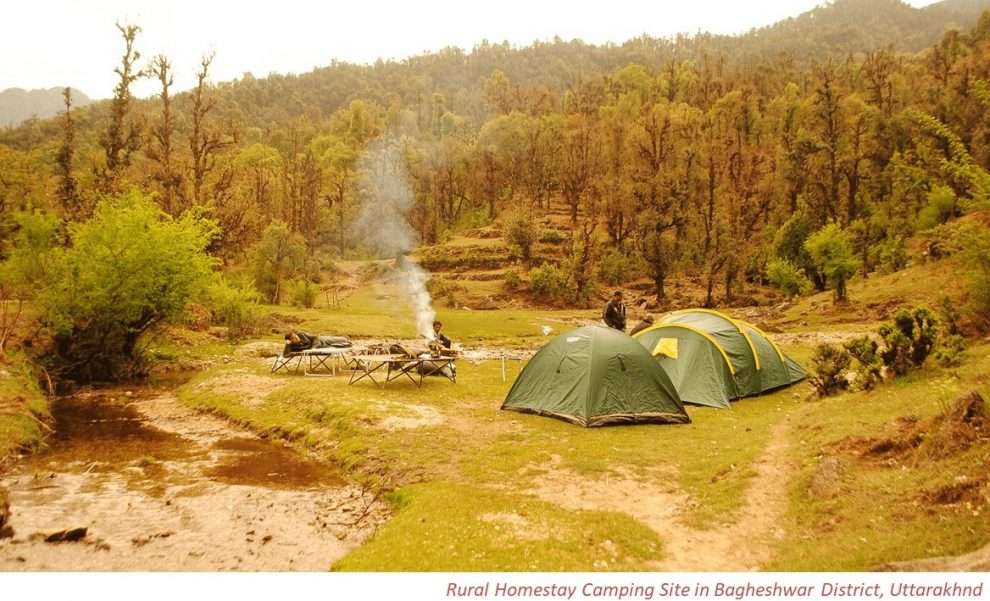
- Google Plus
Social Equity-based Public Private Partnership strategy for development of Agriculture and Rural Tourism has the potential to enhance rural (and farmers’) economic growth. This should be implemented using Cooperatives and other farmer groups, including FPOs and FPCs, opines Tushar Pandey.
In India, most farmers find it difficult to cultivate land in the conventional manner, as it does not offer good economic returns. So they turn to either cultivating cash crops or selling their land. To make their efforts economically viable, an alternate revenue generation model of Agritourism can be framed that can be operated by them. Diversifying into this agribusiness model calls for much less investment and it can help farmers in gaining an additional source of income.
The combination of Agriculture and Tourism has the potential to not only develop the local economy of the farming community but also for retaining youth by creating ample opportunities for earning while safeguarding the environment and the ecology of the place as a whole. Developments on AgTech and FinTech makes synergy possible on many operational aspects of Agritourism, such as marketing, financing, insurance and other institutional mechanisms. Further prospects on enabling entrepreneurship seems plausible owing to the impetus offered by Farmer Groups, including Farmer Producer Organizations and Companies (FPO/FPC), and other forms of cooperatives. Formation of the new Ministry of Cooperatives by the Government of India is a complementary step in the development of Agritourism and must be taken up by the new ministry on a priority basis.
AGRITOURISM
Agritourism, which falls under the category of Alternate Tourism, refers to the act of visiting a working farm or any agricultural, horticultural or agribusiness operation for the purpose of enjoyment, education, or active involvement in the activities of the farm or operation. It synergizes both agriculture and tourism by capitalizing on their best practices. Though not a new idea per se (as it is already in practice in developed countries), we need to give this an Indian touch. Today, there are closer links between agritourism and nature-based or eco-tourism. There are many places in India that offer outstanding scenery and have national parks, wildlife and heritage buildings. Sustainable habitat management is of increasing interest to a highly urbanized population and that’s why agritourism becomes important for both – the urbanized population and farmers.
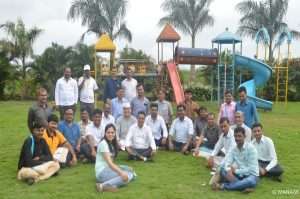
The recent National Sample Survey on Agriculture (NSSO) indicates the sad reality of India’s younger generation being uninterested in taking up agriculture. But agritourism could provide them an opportunity to return to their roots. And what could be better than this where you do your farming and also entertain your guests. Tourists visiting such places can relish a combination of special interest, need and leisure, all that makes it different from conventional tourism.
PUBLIC PRIVATE PARTNERSHIP IN AGRITOURISM
For the development of Agritourism agripreneurs, farmer organizations, co-operatives, funding institutions, NGOs and agribusiness companies need to come together to take up these ventures together with the help of farmers, government agencies and tour operators. Transporters and the hospitality industry are also involved and would benefit in the process. The PPP model provides an appropriate structure for the development of such projects.
The involvement of the state government becomes very important not only in developing such initiatives but to extensively consider the benefits that will ultimately reach the local farmer community. Sustainability monitoring also needs to be taken care of by the government. The major issue is to develop the project considering the long term sustainability of the entire area, population, carrying capacities and farmer benefit. A structured Public Private Partnership approach on Agritourism needs to be evolved after considering the following prime objectives:
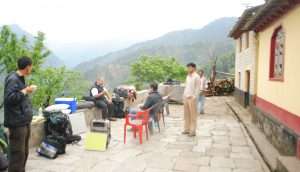
- All Agritourism activities have to be sustainable;
- Focus on environmental, social, cultural and economic sustainability criteria;
- Local communities should benefit economically and culturally from tourism;
- Ecologically sustainable development;
- Minimize impact by visitors;
- Better environment and better health;
- Build environmental and cultural awareness and respect;
- Provide positive experiences for both visitors and hosts;
- Provide direct financial benefits for conservation;
- Provide financial benefits and empowerment for local people;
- Raise sensitivity to host countries’ political, environmental, and social climate;
- Support international human rights and labour agreements.
A farm-based agritourism site needs to be developed on the lines of Public Private Partnership which will take into account the best possible practices and also set an example for all the stakeholders to start such initiatives. Primarily this model farm will showcase the ability of states as a brand for their agricultural produce, promote educational tours, agricultural festivals and fairs, appeals to special interest groups as an experience of the village life style, thereby creating a tremendous market for both domestic and foreign tourists.

Some areas in India have been successful in developing Agritourism. These include: Maharashtra (Pune and Baramati region); Coorg and other regions in Karnataka; Sikkim, Himachal and Uttarakhand (especially on rural homestay models). There are other isolated projects in the states of Tamil Nadu, Kerala, Chhattisgarh, MP and Orissa developed with Agritourism as a theme.
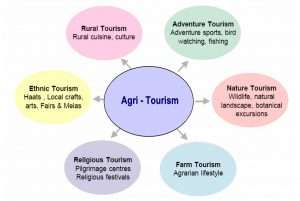
Activity based linkages of Agritourism
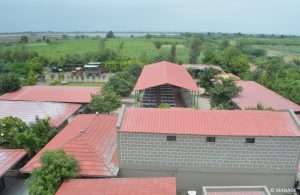
The SPV chart below shows the roles of all the stakeholders in the Agritourism business

The benefits of tourism are well known as it boosts regional development by developing infrastructure, increasing government earnings and revenues through foreign exchange, providing employment to local population, besides enabling lasting peace in conflict ridden areas. Therefore, governments should take up agritourism as a new thrust area and all the stakeholders should take responsibility to promote agritourism. The following steps are critical.
- Agripreneurs should join hands with tourism industry for services;
- Efforts should be made to train local manpower to enter this industry in large numbers;
- Better sharing and dissemination of information on Agritourism through internet and satellite channels;
- Offers made available through major tour operators. They sell it along with other holiday packages;
- The Department of Tourism promoting India as an Agritourism destination in the international market.
The capacities of Extension and Advisory Services (EAS) in this area need to be considerably enhanced in order to identify, encourage, and support farmers and agripreneurs who could potentially initiate agrotourism enterprises. We need specific training modules and programmes for training of trainers in this area so that EAS providers can organize training and capacity building of farmer groups. When this happens we can look forward to an exciting journey where farmers become agripreneurs offering agritourism that can enhance the tourism potential of India to its fullest in a sustainable manner. This is a win-win for both the economy and society as a whole.
LIST OF USEFUL REFERENCES ON THIS TOPIC
A guide to successful agritourism enterprises . https://www.uvm.edu/sites/default/files/Vermont-Agritourism-Collaborative/2019_BestPracticesAgritourism-FINALDRAFT-lores.pdf
AESA. 2018. Face to Face. Extension and Agri-tourism in India . https://www.aesanetwork.org/extension-and-agri-tourism-in-india/
Agritourism fact sheet. 12 Things to consider when starting an agritourism business . LSU Ag Center. Research and extension https://www.lsuagcenter.com/NR/rdonlyres/C5B38132-3756-4978-992E-2A42FAB6537C/93305/agritourismtwelvethings1.pdf
Barbieri C. 2020. Agritourism research : A perspective article. Tourism Review 75(1):149-152. https://doi.org/10.1108/TR-05-2019-0152
Budiasa IW and Ambarawati IGAA. 2014. Community based agro-tourism as an innovative integrated farming system development model towards sustainable agriculture and tourism in Bali. Journal of the International Society for Southeast Asian Agricultural Sciences 20(1):29-40.
Choenkwan S, Promkhambut A, Hayao F and Rambo AT.2016. Does agrotourism benefit mountain farmers? a case study in Phu Ruea district, Northeast Thailand . Mountain Research and Development, 36(2):162-172.
FAO. Agritourism development corporation – Agritourism India . Rome: FAO. http://www.fao.org/family-farming/network/network-detail/en/c/177631/
Goel A. 2014. Linking agro-ecology, biodiversity conservation and agro-tourism. https://orgprints.org/id/eprint/23687/
LAOS – Study visit to an agro-tourism farm . Asia-pacific farmers forum. https://asiapacificfarmersforum.net/laos-study-visit-vangvieng-organic-farm/
Malkanthi SH and Routry JK. 2011. Potential for agritourism development: Evidence from Sri Lanka . Journal of Agricultural Sciences – Sri Lanka 6(1) DOI: 10.4038/jas.v6i1.3812
Nadeesha S. 2018. Promotion of agro tourism in rural areas of Galle district in Sri Lanka . MOJ Curr Res & Rev. 2018;1(4):170-173. DOI: 10.15406/mojcrr.2018.01.00027
Nair, Vikneswaran, Hamzah Amran, and Ghazali Musa, eds. 2020. Responsible Rural Tourism in Asia . Channel View Publications.
Phillip S, Hunter C. and Blackstock, K. 2010. A typology for defining agritourism . Tourism management, 31(6):754-758.
Raj, Saravanan and Todd, Jyoti. 2018. Agro-tourism: YATRA-Farm Tourism Venture . Good Practices in Agricultural Extension and Advisory Services with Agripreneurship. https://www.manage.gov.in/publications/goodpractices/CaseStudy1_Feb2018.pdf
Reddy OSK. 2019. An eco tourism – The sustainable opportunity in the context of rural economies on the lines of un sustainable development goals 2030 . https://www.linkedin.com/pulse/eco-tourism-sustainable-opportunity-context-un-goals-osk-reddy/
Roth, Monika and Ochtersk, Jim. Getting started in agritourism – A cooperative extension guide on to how to begin, what visitors expect, customer relations, income streams, liability, marketing and other useful resources . http://ccetompkins.org/resources/getting-started-in-agritourism
Shehrawat PS. 2009. Agricultural tourism for sustainable rural development . Agricultural Management/Lucrari Stiintifice Seria I, Management Agricol 11(4).

You may also like

Blog 213-Climate Justice, Human Rights, and Hope for The Future

Blog 212-Can We Generate Spaces for the Transformation of Gender Norms through Extension Services?

Blog 211-Moo’ing Forward: Supporting Pastoralism in India
Cancel reply.
I congratulate the author Tushar Pandey for projecting the scope of Agri-farming in India. Recently (15th sept,2021) the Minister of Tourism, Kerala launched Kerala Agri tourism network – Farm tourism as a major initiative to tourism project.
(Minister P A Mohammed Riyas launches Kerala Agri Tourism Network-Farm Tourism PTI Published: Sept… https://www.onmanorama.com/travel/travel-news/2021/09/15/minister-p-a-mohamed-riyas-launched-the-kerala-agri-tourism-network-farm-tourism.html )
The author could have added the following paras to enrich the blog.
The term ‘agri-tourism’ was initially used in the US, but it originated from an Italian National Legal Framework passed in 1985. This law promotes overnight farm stays to diversify the incomes of Italian farmers and support the landscape of farming operations. The seeds of agri-tourism in India were first sown by the formation of the Agri Tourism Development Corporation (ATDC) located at Baramati in Maharashtra. The ATDC was founded in 2004 by Pandurang Taware, an entrepreneur from the farming community.
It is a company that encourages agricultural tourism in Maharashtra and promotes it as a means of diversifying business opportunities and securing a feasible livelihood for farmers. Following a phase of research and an initial pilot programme in a village of Baramati district in 2005, the ATDC has grown, with some trained farmers and agri-tourism locations across the state of Maharashtra. Since its inception, farmers across the state have gained a 25% growth in their incomes.
Ref : Sarath and Sivakumar (2020) https://www.newindianexpress.com/opinions/2020/nov/23/to-enhance-income-of-farmers-consider-agri-tourism-2226815.html
Research Article
Potential development of agro-tourism based on local wisdom in North Kalimantan villages, Indonesia
- @INPROCEEDINGS{10.4108/eai.6-10-2022.2325706, author={Mohamad Nur Utomo and Kaujan Kaujan and Ahmad Mubarak}, title={Potential development of agro-tourism based on local wisdom in North Kalimantan villages, Indonesia}, proceedings={Proceedings of the 2nd International Joint Conference on Hospitality and Tourism, IJCHT 2022, 6-7 October 2022, Singaraja, Bali, Indonesia}, publisher={EAI}, proceedings_a={IJCHT}, year={2022}, month={12}, keywords={agro-tourism local wisdom village development north kalimantan}, doi={10.4108/eai.6-10-2022.2325706} }
- Mohamad Nur Utomo Kaujan Kaujan Ahmad Mubarak Year: 2022 Potential development of agro-tourism based on local wisdom in North Kalimantan villages, Indonesia IJCHT EAI DOI: 10.4108/eai.6-10-2022.2325706
- 1: Faculty of Economics, Universitas Borneo Tarakan
Several villages in North Kalimantan Province have the potential to be developed into agro-tourism locations. The development of agro-tourism in the village by paying attention to local wisdom will positively impact the village's economic, social and environmental aspects. This study aims to identify the potential for village development by building agro-tourism based on local wisdom in North Kalimantan. This study uses a descriptive method, which is sourced from primary data and secondary data. The results of the study indicate that several villages have the potential to be developed as agro-tourism villages based on local wisdom. The results of this study are a continuation of further research to determine the selected village as the object of agro-tourism development and the creation of an agro-tourism management model based on local wisdom in North Kalimantan, Indonesia.

Avi's Village Agrotourism
The Lap Of Nuture
Make Your Golden Memory With Us!
AVI's Village Agrotourism is a charming and picturesque destination nestled in the countryside, offering visitors a unique and immersive experience in rural life. Located in a serene village setting, AVI's Village is a haven for nature lovers and those seeking a break from the hustle and bustle of city life.

Discover Our Room

Deluxe Cottage
The Deluxe Cottages at AVI's Village are cozy and well-appointed, providing a charming retreat amidst nature.

Wooden Cottage
The Wooden Cottages at AVI's Village exude a rustic charm, perfect for those seeking a unique and traditional experience.

Luxurious Villa
The Luxurious Villas at AVI's Village provide an upscale and indulgent experience for guests who desire a touch of luxury.

Stone Villa
The Stone Villas at AVI's Village exude a timeless elegance, blending harmoniously with the rural landscape.

Private Villa
The Private Villas at AVI's Village offer exclusivity and seclusion, providing a personal haven for guests seeking privacy and tranquility.
AVI's Village Agrotourism offers a wide array of amenities to ensure a memorable and enjoyable stay for its guests. Indoor game enthusiasts can indulge in thrilling matches of table tennis, snooker, pool, carrom, chess, and enjoy friendly games of housie and playing cards. For those seeking outdoor adventures, AVI's Village provides facilities for badminton, cricket, archery, and volleyball, encouraging physical activity and team spirit. Additionally, guests can relax and rejuvenate in the two swimming pools equipped with a massage system, participate in the lively rain dance sessions, explore the nearby water bodies with boating activities, gather around a cozy bonfire in the evening, and enjoy leisurely moments in the library. The resort also offers a projector setup for entertainment purposes and provides soothing music throughout the premises. For a unique experience, guests can indulge in fish spa therapy or try the exhilarating water roller and water zorb activities. With a wide range of amenities both indoors and outdoors, AVI's Village Agrotourism ensures an engaging and enjoyable stay for guests of all ages.

AVI's Village Agrotourism
Conference hall.
AVI's Village Agrotourism boasts a well-equipped conference hall that is designed to cater to the needs of corporate events, seminars, and meetings. The spacious hall can accommodate around 40-50 people comfortably with chair seating arrangements. The conference hall is equipped with two air conditioners to ensure a comfortable and conducive environment for attendees. A projector setup is available for presentations and visual aids, allowing for effective communication during conferences. The facility also includes two separate washrooms for the convenience of the guests. To support modern connectivity needs, the conference hall provides WiFi access, ensuring seamless internet connectivity for participants. Whether it's a business meeting or a corporate event, AVI's Village Agrotourism's conference hall offers a professional setting with all the necessary amenities for a successful gathering.

What Client Say
I had been with my Family of 12 adults and 2 little babies. The property is extremely beautiful 😍 the rooms are huge and well maintained. We visited this place in Summer season, but the Room AC were well maintained, So we could enjoy our stay. I would recommend this place to everyone who wants to stay around Greenery, Trees, birds, Waterbodies and Food. Will visit this place in Rainy season to enjoy it to the fullest.
Surabhi Magoo
Location is superb. well maintained property. Food is really delicious. Staff is highly helpful and take care of us. offered bone fire also at night. Highly recommended for friends and family too. If possible go on weekdays for better calm and serene natural experience.
Sunny Rajput
Had a weekend vacay at this place. The property is well maintained, the staff is prompt on service and everyone seems to have a helping attitude. They are always open to suggestions and have quickly intervened to get anything set and ready for you. The food is outstanding. Adults and kids alike enjoy this place as it is wind down and entertainment guaranteed.
Rehan Shaikh
Very well managed resort. Food is delicious.. Chef and other staff are very helpful and frndly.. Owners themselves attend customers in a very friendly manner.. Rooms and swimming pool were clean. Best part is this resort is pet frndly and did not stop our pets in any of the area.. Shall definitely visit again.
Adv. Pinaz Contractor
Had a stay for 2 nights this week. Rooms are quite good, breakfast menu is excellent with lot of varieties, high tea also is quite good, lunch and buffet menu is also very good with varieties swimming pool is good and clean. good and enjoying. Live music and dj was good overall a very nice experience Decent food n stay
Manoj Patil
I don't need to talk much basis the star given. Though the property is little away from Karjat station, approx 10 km, the owner taking full care of his customer. Authentic food, neat, clean and hygienic room. You can enjoy serene beauty of nature here. Few of the villas are just on the corner of river bank. You enjoy river view taking sip of your morning tea.
Sushant Rane
Nice place to spend holidays with family or friends. Service was a really good.Lovely heart touching place.Great atmosphere,nice foods,polite staffs, pocket friendly and all the views are outstandingand.Specially pool area.I had great time.❤️
Raj Terwankar
Excellent food, service and amenities.. lot of internal activities are there for kids.. clean and hygienic place.. service is also excellent.. team is prompt and attentive.. Worth to visit with family or friends..
Vaidehi Salvi

Latest News

Kondana Caves
Do not forget to visit the antiquated rock-cut Kondana Caves in Karjat. These are age old Buddhist caves and

Kothaligad (Peth) Fort
The Kothaligad fort is based in the eastern part of Karjat, Maharashtra and is a must amongst all the places to

Jain Temple
The Jain temple is a significant place of worship for the Jain community in Karjat. It is an architectural marvel

Kondeshwar temple
Based in Sanshi, the Kondeshwar temple is very well known for its magnificent structural design. It is very

Traverse on the roads of Bhor Ghat when in Karjat and admirer the spellbinding beauty of nature.The age old

Bahiri Cave
Bahiri Caves is a special traveller destination in Karjat city of Maharashtra state, as it pulls in an equivalent

AVI's Village Agrotourism is a charming and picturesque destination nestled in the countryside, offering visitors a unique and immersive experience in rural life.
- The AVI'S Village, Vanjarwadi, post-Gaulwadi, Karjat, Raigad, 410201
- +91-9284049505, +91-9822810307
- [email protected]
Copyright 2023 AVI's Village Agrotourism. All Rights Reserved. Design By Asiatech Inc
Terms & Privacy Policy

IMAGES
VIDEO
COMMENTS
Los Poblanos Historic Inn & Organic Farm in Albuquerque, New Mexico. Imagine walking through fields of lavender, pausing to inhale the fresh scent and admire the giant cottonwood trees that surround them. This is the setting at Los Poblanos, an inn and organic farm in Albuquerque. This inn is steeped in history, and you can immerse yourself in ...
MONTERIA VILLAGE is an agro tourism destination designed to give a guest an elevated experience of a quintessential village life. 1800 532 9040. Village Experience; Weddings; About Us; ... A Maharashtra Tourism Certified AGRO TOURISM CENTRE. Are you ready to go back to your roots? Directorate of tourism - Maharashtra Tourism. Monteria Village ...
Miliou. With a population of about sixty residents, Miliou is one of the smallest villages in Cyprus. It is also one of the greenest villages in the area, thanks to an rich supply of spring water which irrigates the surrounding almond trees, vineyards and citrus groves. Spring is a best season to visit as blossoming almond trees decorate the area.
Brazil. Brazil is a vast country, 86% of the size of the U.S., with abounding natural resources and a vibrant, diverse agricultural industry. The South American nation is one of the world's ...
Agro-tourism properties offer all these exciting activities and more. These adventure activities don't take away from nature - they actually make it better! Zip-lining lets you soar over trees and streams, horseback riding takes you closer to animals and natural trails, and hiking lets you conquer new heights while enjoying the scenery. ...
The agro tourism villages in the five selected areas involves 75 households. The government has launched the community-based agro tourism village for the first time targeting tourists who like greenery, quiet and calm natural environment, said Shankar Sapkota, deputy spokesperson of the ministry.
Agro-tourism is a way of sustainable tourist development and multi-activity in rural areas aimed for enhancing higher standards of living for rural communities especially through increased income for people who work in agriculture. ... Village fairs and festivals Animal Rides Farm Stay Cow Milking Rural art and craft. Volume 1 - Issue 1 13
UN Tourism understands Rural Tourism as "a type of tourism activity in which the visitor's experience is related to a wide range of products generally linked to nature-based activities, ... This report delves into over 200 village cases submitted to the Best Tourism Villages Initiative in 2021 and 2022, offering direct insights into on-the ...
Agritourism Is the Concept of Vacationing on a Farm—Try It Out at These 10 Pastoral Properties. Agritourism is a portmanteau of agriculture and tourism. The concept, affiliated with ecotourism ...
Agro-Tourism Agencies: These are specialized agencies that connect tourists with farms. They handle bookings, itineraries, and transportation. Community Co-ops: Often, local farmers band together in cooperatives. These co-ops can offer a more varied agro-tourism experience, showcasing multiple farms and practices.
The relationship of agro-tourism and sustainability and sustainable development has been discussed in numerous journal articles [4]. Moreover, a study in Russia concluded that agro-tourism is a ...
The benefits of agritourism. Agritourism has advantages for everyone involved. The additional revenue stream from offering guests overnight accommodation can be crucial to the livelihood of small farms, diversifying business and providing a stable income for the farmer. There is often a flow-on effect on the local community.
On Jul 19, 2023. Nigeria has made history in the Agro tourism Sector as the country has held the ground-breaking and foundation-laying ceremony of the first Nigerian Agro tourism Village project, located in Oyo State. The project, inaugurated by the Presidency, through the Office of the Secretary to the Government of the Federation, is an ...
AVI's Village Agrotourism is dedicated to preserving and promoting local culture and traditions. Guests can engage in traditional craft workshops, such as pottery, weaving, or basket making, guided by skilled artisans from the village. This not only provides a unique cultural experience but also helps support local craftsmanship and ensures the ...
Many agricultural businesses and owners are responding by expanding into new markets to survive these challenges and changes. With tourism proving itself as a global economic powerhouse, the merger between tourism and agriculture seems like a practical path forward to diffuse mass tourism and support agriculture businesses.Smaller, high-cost producers can use tourism to help stabilize their ...
Food production has high potential and link to agro-tourism, also called green-tourism, development (Joshi et al., 2020) which is essential for environmental, economic and socio-cultural ...
Wesleyan Journal of Research, Vol 13 No 68 (March 2021) Research article: (Agro Tourism) [ 93 ] ... • Village tourism: where tourists live and enjoy peasant life's various activities.
Promotion of agro tourism in rural areas of Galle district in Sri Lanka. MOJ Curr Res & Rev. 2018;1(4):170-173. ... Following a phase of research and an initial pilot programme in a village of Baramati district in 2005, the ATDC has grown, with some trained farmers and agri-tourism locations across the state of Maharashtra. Since its inception ...
Agro tourism is an innovative agricultural activity related to tourism. it has a great capacity to ... tourist to traditional village food, handicraft, culture, folk dance, bullock cart ride, milking cows and goat and picking farm fresh fruits and vegetables. This creates win win situation for the farmers who can earn
This research aims to formulate a model of strategy and program for the development of agro-based tourism villages in Catur Village, Kintamani District, Bangli Regency. This research is characterized by a combination of qualitative and quantitative research. The quantitative research type is specifically used to determine the rating, weight, and score of internal and external factors in ...
The development of agro-tourism in the village by paying attention to local wisdom will positively impact the village's economic, social and environmental aspects. This study aims to identify the potential for village development by building agro-tourism based on local wisdom in North Kalimantan. This study uses a descriptive method, which is ...
AVI's Village Agrotourism boasts a well-equipped conference hall that is designed to cater to the needs of corporate events, seminars, and meetings. The spacious hall can accommodate around 40-50 people comfortably with chair seating arrangements. The conference hall is equipped with two air conditioners to ensure a comfortable and conducive ...
With its emphasis on organic farming, village-like ambiance, and entertaining experiences, Avani Agro Tourism is a one-of-a-kind holiday spot that promises an unforgettable journey to reconnect with nature. Overall, Avani Agro Farms is a unique vacation destination that promises visitors an unforgettable experience.